Download
Roundup � September 2012/1
Brian Wilson
The August 2012/2 Roundup is here
and earlier editions are indexed here.
I�ve been asked, very reasonably, why I don�t feature the BIS
special offers from eclassical.com
It isn�t always easy to be topical with these or with Hyperion�s
regular half-price �please buy me� offers (temporarily on hold
during their sale but returning from the start of September).
Both are well worth checking out regularly: at the time of writing
there�s the 24-bit download of Bach Cantatas, Volume 51, a new
release (BIS-SACD-1961)
for the same price as the 16-bit and mp3, plus a 30% discount
on Schütz Geistliche Chormusik (Sacred Choral Music,
BIS-CD-831/2).
From 30 August 2012 there will be an offer on Allan Pettersson�s
Symphony No.6 (
BIS-CD-1980) and his Symphonies Nos. 1 and
2 (
BIS-CD-1860
-
review),
both with the Norrköping Symphony Orchestra/Christian Lindberg.
Freebie of
the Month
Johann Sebastian BACH (1685-1750)
Early Cantatas Vol.1
Cantatas Nos.4, 131, 106 and 196
The Purcell Quartet, with Peter Harvey (bass), Michael Chance
(counter-tenor), Emma Kirkby (soprano), and Charles Daniels (tenor).
CHANDOS CHAN0715 [76:08] � from
theclassicalshop.net
(mp3, 16- and 14-bit lossless)
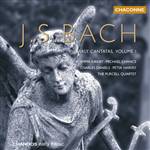
Having
recommended this recording at least twice*, I could hardly fail
to be even more enthusiastic about the mp3 version being offered
free to subscribers to Chandos� theclassicalshop.net e-magazine
newsletter for August 2012. It�s free to join, so there�s no risk
involved. The pdf booklet is available from the link above and
can be saved.
* October 2008
Roundup
and August 2012/1
Roundup
in review of Teldec Harnoncourt and Leonhardt Bach cantata series.
***
Music from the Spanish Kingdoms
Juan del ENCINA (1468-1529)
Hoy comamos y bebamos [1:45]
Tres morillas enamoran (anon.) [1:24]
Alonso HERNANDEZ (fl. early
16th c.) Tres moricas me enamoran [4:01]
Gagliarda, mi racomando (anon.) [0:56]
Gagliarda, lombarda (anon.) [1:01]
Gagliarda, el tu tu (anon.) [1:17]
Adrian WILLAERT (1480-1562)
Vecchie letrose [1:32]
Marchetto CARA (1465-1525) Liber
fui un tempo in foco [3:39]
Francesco da MILANO (1497-1543)
la Spagna [2:12]
Bartolomeo TROMBONCINO (1470-1535)
Come haro donque ardire [2:55]
Alonso MUDARRA (1508-1580) Tiento
para harpa [0:38]
Juan VASQUEZ (1500-1560)
En la fuente de un rosel [1:47]
Josquin DESPREZ (1440-1521)
Ile fantazies de Joskin [1:58]
Loyset COMPÈRE (d. 1518)
Scaramella [1:11]
Johannes MARTINI (1440-1497)
Fuge la morte [2:05]
Juan del ENCINA Entra
mayo [1:19]
Gentil dame (anon.) [2:36]
Juan del ENCINA Mas vale
trocar [1:36]
Ay triste que vengo! [1:23]
Si habéis dicho, marido (anon.) [1:12]
Diego ORTIZ (1510-1570)
Ricercar [1:49]
O felici occhi miei [2:19]
Giovan Tomas di MAIO (d. 1563)
O trezze bionde [4:43]
Miguel FUENLLANA (1525-1585)
Fantasia sexta [1:51]
Sagaleja del Casar (anon.) [0:58]
Diego ORTIZ Passamezzo
moderno [2:39]
Johannes MARTINI Cayphas
[2:13]
Giovan Tomas di MAIO Tutte
le vecchie son maleciose [2:19]
Alonso HERNANDEZ (?) La
tricotea [1:32]
Juan del ENCINA Si hábra
en este baldrés? [2:07]
Nancy Hadden (flute, recorder and crumhorn/director); Emily
van Evera (soprano); Erin Headley (viola da gamba, lirone and
fiddle); Paula Chateauneuf (lute and renaissance guitar); Andrew
Lawrence-King Gothic (harp, Spanish Harp and psaltery) � rec.1989.
DDD.
Pdf booklet with texts and translations included.
CRD CRD3447 [61:02] � from classicsonline.com
(mp3) or stream from Naxos Music Library
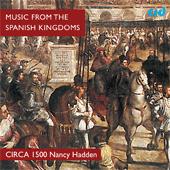 It�s
good to see CRD recordings in general circulation again, on
CD as well as in download form. Emily van Evera�s bright tones
have practically become the default sound in my imagination
for music of this period, even displacing Jantina Noorman�s
even more forthright voice � her 1968 recording with Musica
Reservata, Music from the Time of Christopher Columbus
briefly surfaced on CD but has disappeared again: it�s worth
looking out for a remaindered or second-hand copy. (Philips
432 8212).
It�s
good to see CRD recordings in general circulation again, on
CD as well as in download form. Emily van Evera�s bright tones
have practically become the default sound in my imagination
for music of this period, even displacing Jantina Noorman�s
even more forthright voice � her 1968 recording with Musica
Reservata, Music from the Time of Christopher Columbus
briefly surfaced on CD but has disappeared again: it�s worth
looking out for a remaindered or second-hand copy. (Philips
432 8212).
The booklet of texts and translations confers a real advantage,
though there are one or two examples of careless proof-reading:
En la fuente de un rosinel (tr.12) is correctly printed
in the table of contents, but the final word is printed twice
as rosine! in the text, suggesting that the booklet was
produced from a scan of the original. Maguera pastor,
the refrain of Ay triste che vengo (tr.19) is translated
as �a mere shepherd�, when the feminine adjective clearly indicates
that the recipient of the singer�s love is a shepherdess.
If you�re looking for another programme of Spanish music from
this period, go for the slightly softer-toned performances on
Music from the Time of Columbus (Linn CKD007,
Catherine Bott et al with the New London Consort/Philip Pickett
[55:57]). Download from linnrecords.com
(mp3 and lossless). There are a few inevitable overlaps,
such as the ubiquitous Niña y viña.
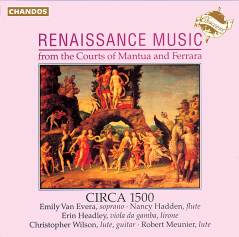 Emily
van Evera�s forthright tone is a little less suited to the Renaissance
Music from the Courts of Mantua and Ferrara, by Marchetto
CARO and other composers, on Chandos Chaconne CHAN0524
[54:54] (Circa 1500 again, directed by Nacy Hadden (flute),
with Erin Headley (gamba and lirone), Christopher Wilson (lute
and guitar) and Robert Meunier (lute) � rec. 1984: download
from theclassicalshop.net
(mp3 and lossless) with pdf booklet of notes, texts and translations.
Despite that small reservation, I still very much enjoyed the
recording and there�s no direct rival in this programme. The
earlier release on CHAN8333 is also still available for
download at the same price � take your pick.
Emily
van Evera�s forthright tone is a little less suited to the Renaissance
Music from the Courts of Mantua and Ferrara, by Marchetto
CARO and other composers, on Chandos Chaconne CHAN0524
[54:54] (Circa 1500 again, directed by Nacy Hadden (flute),
with Erin Headley (gamba and lirone), Christopher Wilson (lute
and guitar) and Robert Meunier (lute) � rec. 1984: download
from theclassicalshop.net
(mp3 and lossless) with pdf booklet of notes, texts and translations.
Despite that small reservation, I still very much enjoyed the
recording and there�s no direct rival in this programme. The
earlier release on CHAN8333 is also still available for
download at the same price � take your pick.
John DOWLAND (c.1563-1626) �
a Selection
Now that the Penguin Guide has been reduced to a shadow of its
former self, many will have turned to the Gramophone Guide,
but there are some composers who are shamefully neglected there
and Dowland is one of them, with just three recommendations.
Let me supplement that meagre offering, though such is the healthy
state of recorded Dowland that I�m able only to scratch the
surface.
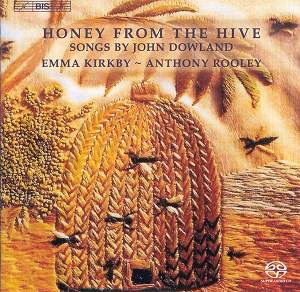 No
collection should be without recordings by Emma Kirkby; the
enthralling album Honey from the Hive on which
she performs a selection of Dowland�s songs with the assured
accompaniment of Anthony Rooley (lute) is one of her best: BIS
BIS-SACD-1475 [65:22]. You�ll find full track details
in an appreciative review
from Em Marshall. Download in mp3, 16- or 24-bit sound from
eclassical.com;
the mp3 is more than adequate, the 24-bit superb. Both come
with the booklet in pdf form.
No
collection should be without recordings by Emma Kirkby; the
enthralling album Honey from the Hive on which
she performs a selection of Dowland�s songs with the assured
accompaniment of Anthony Rooley (lute) is one of her best: BIS
BIS-SACD-1475 [65:22]. You�ll find full track details
in an appreciative review
from Em Marshall. Download in mp3, 16- or 24-bit sound from
eclassical.com;
the mp3 is more than adequate, the 24-bit superb. Both come
with the booklet in pdf form.
In recent years BIS has had a near-monopoly of Emma Kirkby,
but Hyperion have an earlier programme of music by Dowland and
his contemporaries and successors:
Time Stands Still
John DOWLAND
His golden locks Time hath to silver turned [3:09]
Thomas CAMPION (1567-1620)
Though you are young and I am old [2:11]; Come, cheerful day
[2:21]
Anonymous Lost is my liberty [2:36]
John DOWLAND It was a time
when silly bees could speak [2:25]
Thomas FORD (d.1648) Go,
passions, to the cruel fair [3:10]
John DOWLAND Far from triumphing
court [6:13]
George HANDFORD (1582/8-1647)
Now each creature [2:00]
John DANYEL (1564-1626)
Time, cruel Time [3:10]; He whose desires are still abroad [2:15]
Alfonso FERRABOSCO (1542/3-1588)
Pavan [3:22]
John DOWLAND Flow not so
fast, ye fountains [2:38]
Philip ROSSETER (1567/8-1623)
What then is love but mourning? [1:22]
John DOWLANDTime stands
still [4:00]
William LAWES (1602-1645) Gather
your rosebuds whilst you may [0:56]
Anonymous Mignonne allons [2:16]
Emma Kirkby (soprano); Anthony Rooley (lute) � rec. 1987. DDD.
Pdf booklet with texts included.
HYPERION CDA66186 [44:04] � Archive Service or download
from hyperion-records.co.uk
(mp3 and lossless)
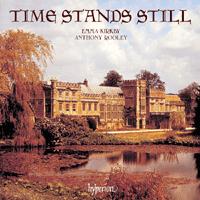 There
is absolutely no artistic reason why this should have fallen
so far from grace that it�s available to special order only
on CD, apart, perhaps, from the short playing time. The download
price of £5.49 takes care of that. The many admirers of
Emma Kirkby should add this and her BIS Dowland to their collections.
The (live) recording is good and the booklet comes with the
deal.
There
is absolutely no artistic reason why this should have fallen
so far from grace that it�s available to special order only
on CD, apart, perhaps, from the short playing time. The download
price of £5.49 takes care of that. The many admirers of
Emma Kirkby should add this and her BIS Dowland to their collections.
The (live) recording is good and the booklet comes with the
deal.
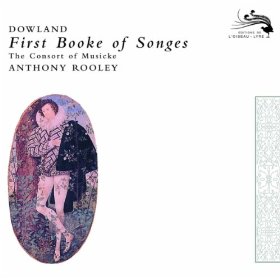 Emma
Kirkby also features among the members of the Consort of Musicke,
directed by Anthony Rooley in Dowland�s First Booke of Songs
or Ayres (1597): Decca Oiseau-Lyre 475 9114 [75:06],
recorded in 1976. I praised this recording in my August 2009
Roundup.
The link to passionato.com which I listed there no longer applies
but deutschegrammophon.com
offer an mp3 download for £7.99 or lossless for £9.49.
If you feel like splashing out, hmvdigital.com
include this and eleven other CDs in Dowland�s Collected
Works for £36.99. Neither the First Booke nor the
complete set is currently available on CD but several other
recordings of music from this period by the Consort of Musicke
have reappeared on Australian Decca Eloquence at mid price;
don�t hold your breath, but some of the Dowland recordings may
join them (?).
Emma
Kirkby also features among the members of the Consort of Musicke,
directed by Anthony Rooley in Dowland�s First Booke of Songs
or Ayres (1597): Decca Oiseau-Lyre 475 9114 [75:06],
recorded in 1976. I praised this recording in my August 2009
Roundup.
The link to passionato.com which I listed there no longer applies
but deutschegrammophon.com
offer an mp3 download for £7.99 or lossless for £9.49.
If you feel like splashing out, hmvdigital.com
include this and eleven other CDs in Dowland�s Collected
Works for £36.99. Neither the First Booke nor the
complete set is currently available on CD but several other
recordings of music from this period by the Consort of Musicke
have reappeared on Australian Decca Eloquence at mid price;
don�t hold your breath, but some of the Dowland recordings may
join them (?).
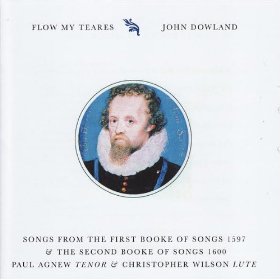 Alternatively
Paul Agnew and Christopher Wilson perform a slightly understated
selection from Books I and II on Metronome METCD1010
� download from emusic.com or amazon.co.uk. You can try out
this attractive set of performances from Spotify. Subscribers
to emusic.com can pick and choose individual items � perhaps
songs that they don�t possess in other versions.
Alternatively
Paul Agnew and Christopher Wilson perform a slightly understated
selection from Books I and II on Metronome METCD1010
� download from emusic.com or amazon.co.uk. You can try out
this attractive set of performances from Spotify. Subscribers
to emusic.com can pick and choose individual items � perhaps
songs that they don�t possess in other versions.
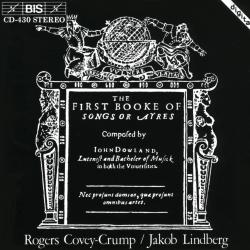 If
you prefer to have the whole First Booke sung
by one person, you�re hardly likely to go wrong with the 1988
BIS recording featuring Rogers Covey-Crump and Jakob Lindberg
(BIS-CD-430 [72:47]). Among the virtues of this recording
are the effective rearrangement of the order of the songs, beginning
with one of the best known, No.19, Awake sweet love,
and a negative facsimile of the first edition on the cover.
Download from eclassical.com
for $10.92 in mp3 and lossless and the pdf booklet comes
as part of the deal. For the reasonable asking price you can
download the lossless (flac) for your home audio system and
return later for the mp3. I burned the latter and the mp3 version
of Honey from the Hive (above) onto one CDR for playing
in the car and still had room; use the free iTunes player and
instruct it to burn an mp3 CD.
If
you prefer to have the whole First Booke sung
by one person, you�re hardly likely to go wrong with the 1988
BIS recording featuring Rogers Covey-Crump and Jakob Lindberg
(BIS-CD-430 [72:47]). Among the virtues of this recording
are the effective rearrangement of the order of the songs, beginning
with one of the best known, No.19, Awake sweet love,
and a negative facsimile of the first edition on the cover.
Download from eclassical.com
for $10.92 in mp3 and lossless and the pdf booklet comes
as part of the deal. For the reasonable asking price you can
download the lossless (flac) for your home audio system and
return later for the mp3. I burned the latter and the mp3 version
of Honey from the Hive (above) onto one CDR for playing
in the car and still had room; use the free iTunes player and
instruct it to burn an mp3 CD.
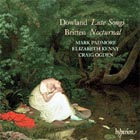 There
are inevitable duplications among these recommendations. On
Hyperion CDA67648 (from hyperion-records.co.uk,
mp3 and lossless [74:02]) Mark Padmore and Elizabeth Kenny include
some very fine performances of songs from all the Books of Songs
but the unique selling point of this album is the inclusion
at its centre of Craig Ogden (guitar) playing Benjamin Britten�s
Nocturnal after John Dowland, Op.70, immediately after
its inspiration, Come, heavy sleep. I refer you to Michael
Greenhalgh�s review
of this �terrific disc� (Recording of the Month)
for full programme details.
There
are inevitable duplications among these recommendations. On
Hyperion CDA67648 (from hyperion-records.co.uk,
mp3 and lossless [74:02]) Mark Padmore and Elizabeth Kenny include
some very fine performances of songs from all the Books of Songs
but the unique selling point of this album is the inclusion
at its centre of Craig Ogden (guitar) playing Benjamin Britten�s
Nocturnal after John Dowland, Op.70, immediately after
its inspiration, Come, heavy sleep. I refer you to Michael
Greenhalgh�s review
of this �terrific disc� (Recording of the Month)
for full programme details.
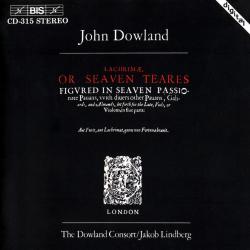 The
sections of Dowland�s masterpiece for consort Lachrimæ
(1604) are interspersed with some of his other music on In
darkness let me dwell: the seven shades of melancholy (Deutsche
Harmonia Mundi 88697225022 [66:30] � details here).
Reviewing this on CD, I thought it well worth considering, though
ultimately I prefer to hear Lachrimæ straight through
without interruption. For that reason � and many more � my preference
goes to The Dowland Consort directed by Jakob Lindberg on BIS-CD-316
[65:26]. The fourteen other Dowland works which are included
follow Lachrimæ. I bought that splendid recording
on CD many years ago when some BIS recordings were released
on the Boots label under licence: download from eclassical.com
in mp3 or 16-bit lossless; both sound very well, the lossless
at least as good as the Boots CD.
The
sections of Dowland�s masterpiece for consort Lachrimæ
(1604) are interspersed with some of his other music on In
darkness let me dwell: the seven shades of melancholy (Deutsche
Harmonia Mundi 88697225022 [66:30] � details here).
Reviewing this on CD, I thought it well worth considering, though
ultimately I prefer to hear Lachrimæ straight through
without interruption. For that reason � and many more � my preference
goes to The Dowland Consort directed by Jakob Lindberg on BIS-CD-316
[65:26]. The fourteen other Dowland works which are included
follow Lachrimæ. I bought that splendid recording
on CD many years ago when some BIS recordings were released
on the Boots label under licence: download from eclassical.com
in mp3 or 16-bit lossless; both sound very well, the lossless
at least as good as the Boots CD.
Like most of Dowland�s music, everything on this recording is
predominantly melancholy: Lachrimæ means tears
and the motto on the title page is aut furit aut lachrimat
quem non Fortuna beavit* � but it�s a pleasant rather than
a depressing melancholy. It was all part of the fashion of the
day, with Dowland punning on his name and the Latin word dolens,
lamenting, in one of the songs included in the collection.
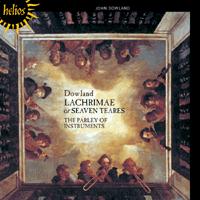 There�s
also a budget-price collection of Lachrimæ which
has the added advantage of including a few extra pieces: Hyperion
Helios CDH55339
� The Parley of Instruments/Peter Holman: download in mp3 or
lossless from hyperion-records.co.uk. I considered this alongside
the BIS and yet another collection on Linn in the July 2010
Roundup
and concluded that there was little to choose between the Hyperion
and BIS versions. The Linn version (CKD194), like that
on Deutsche Harmonia Mundi, breaks the sequence of the items
and offers a short playing time, but has the advantage of adding
a vocal contribution.
There�s
also a budget-price collection of Lachrimæ which
has the added advantage of including a few extra pieces: Hyperion
Helios CDH55339
� The Parley of Instruments/Peter Holman: download in mp3 or
lossless from hyperion-records.co.uk. I considered this alongside
the BIS and yet another collection on Linn in the July 2010
Roundup
and concluded that there was little to choose between the Hyperion
and BIS versions. The Linn version (CKD194), like that
on Deutsche Harmonia Mundi, breaks the sequence of the items
and offers a short playing time, but has the advantage of adding
a vocal contribution.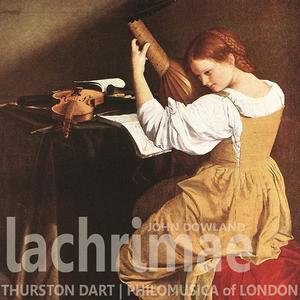
There are more than sentimental reasons for considering the
pioneering (1958) recording of Lachrimæ made by
Thurston Dart with the Philomusica of London for Decca Oiseau-Lyre
and reissued in a decent transfer by Past Classics � download
for £1.26 or less from emusic.com
(mp3). Non-subscribers will find this for £2.37 from hmvdigital.com.
There�s another transfer by Emkay with an inappropriately gaudy
cover at a much higher price.
John DOWLAND Sir Henry Guilford
his Almaine [4:33]
Lachrimæ [4:28]
Lord Souch his Galliard [2:28]
The Shoemaker�s Wife ‘A Toy� [1:27]
Suzanna [3:33]
Captain Digorie Piper his Pavan and Galliard [6:31]
Sir George Whitehead his Almaine [2:53]
Lady Hunsdon�s Almaine [5:32]
Sir Henry Umpton�s Funerall [4:45]
Sir Thomas Collier his Galliard [2:37]
Mistress Winter�s Jump [1:55]
Fortune my Foe [5:06]
Sir John Smith his Almaine [4:53]
Extempore String Ensemble � rec. DDD
Pdf booklet included
HYPERION CDA66010 [50:41] � Archive Service or download
from hyperion-records.co.uk
(mp3 and lossless)
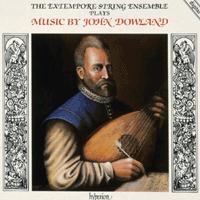 The
only possible reason for this recording to have descended to
the limbo of the special-order Archive Service is that it duplicates
several of the items from the Lachrimæ collection,
but the performances are so good � slightly brighter and sharper
in tone than the others referred to here � for me to overlook
that. The slightly short playing time and the less than complete
state of the pdf booklet bring the compensation of a lower price
for the download of £5.49. Don�t overlook this one.
The
only possible reason for this recording to have descended to
the limbo of the special-order Archive Service is that it duplicates
several of the items from the Lachrimæ collection,
but the performances are so good � slightly brighter and sharper
in tone than the others referred to here � for me to overlook
that. The slightly short playing time and the less than complete
state of the pdf booklet bring the compensation of a lower price
for the download of £5.49. Don�t overlook this one.
If you ever have some time to spare while in the vicinity of
the National Portrait Gallery in London, do try to look at the
fantastic** painting of Sir Henry Unton�s (or Umpton�s) Funeral
which Dowland depicted in music.
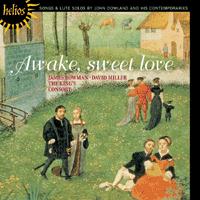 The
Emma Kirkby recording Time stands still (above) is not
the only one to place Dowland�s music in context with that of
his contemporaries. On the first-class budget-price album Awake,
sweet love James Bowman (countertenor) is joined by
David Miller (lute) and the viols of the King�s Consort in music
by Dowland (mostly), Thomas CAMPION,
Thomas FORD, Edward JOHNSON, John DANYEL, Alonso FERRABOSCO,
William HUNNIS and the anonymous Come tread the
paths of pensive pangs: Hyperion Helios CDH55241
[72:22]. Full track details in review
by Jonathan Woolf; download from hyperion-records.co.uk
(mp3 and lossless). As always with Hyperion, the download contains
an exemplary booklet.
The
Emma Kirkby recording Time stands still (above) is not
the only one to place Dowland�s music in context with that of
his contemporaries. On the first-class budget-price album Awake,
sweet love James Bowman (countertenor) is joined by
David Miller (lute) and the viols of the King�s Consort in music
by Dowland (mostly), Thomas CAMPION,
Thomas FORD, Edward JOHNSON, John DANYEL, Alonso FERRABOSCO,
William HUNNIS and the anonymous Come tread the
paths of pensive pangs: Hyperion Helios CDH55241
[72:22]. Full track details in review
by Jonathan Woolf; download from hyperion-records.co.uk
(mp3 and lossless). As always with Hyperion, the download contains
an exemplary booklet.
Thomas CAMPION (1567-1620) It
fell on a summer�s day [1:50]
Think�st thou to seduce me then? [2:22]
John DOWLAND Awake, sweet
love, thou art returned [2:25]
I saw my lady weep [3:40]
What if I never speed? [1:42]
Thomas CAMPION Shall I come,
sweet love? [2:25]
I care not for these ladies [2:28]
Come, cheerful day, part of my life to me [3:45]
Thomas CAMPION Sweet, stay
awhile, why will you rise? [3:48]
Fine knacks for ladies [2:30]
Thomas CAMPION Come, you
pretty false-eyed wanton [1:28]
Her rosy cheeks, her ever smiling eyes [1:55]
Fire, fire, fire! [1:55]
Thomas CAMPION If my complaints
could passions move [3:23]
Say, Love, if ever thou didst find [1:49]
Thomas CAMPION Never weather-beaten
sail [2:07]
The cypress curtain of the night [5:01]
There is none, O none but you [1:14]
Thomas CAMPION Shall I sue,
shall I seek for grace? [2:57]
Now, Oh now I needs must part [4:36]
Ian Partridge (tenor); Jakob Lindberg (lute) � rec.1983. DDD
Pdf booklet with texts included
HYPERION HELIOS CDH88011 [53:20] � CD from Archive Service
or download from hyperion-records.co.uk
(mp3 and lossless)
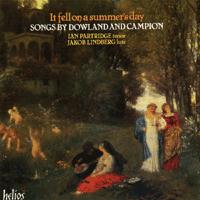 Ian
Partridge�s voice is sufficiently similar to that of Peter Pears
to remind me of the Decca 10" mono LP on which I first
heard the songs of Dowland and his contemporaries (recently
reissued with Pears and Britten in later repertoire on Heritage
HTGCD224). With Jakob Lindberg in the role taken by Julian
Bream on that old recording this is an excellent substitute
and, of course, the recording and documentation are superior
to that LP or its electronic stereo successor on Decca Eclipse.
I can think of no valid reason why this recording has been deleted
in CD format; Dowland and Campion make an excellent pair and
the performances are sensitive.
Ian
Partridge�s voice is sufficiently similar to that of Peter Pears
to remind me of the Decca 10" mono LP on which I first
heard the songs of Dowland and his contemporaries (recently
reissued with Pears and Britten in later repertoire on Heritage
HTGCD224). With Jakob Lindberg in the role taken by Julian
Bream on that old recording this is an excellent substitute
and, of course, the recording and documentation are superior
to that LP or its electronic stereo successor on Decca Eclipse.
I can think of no valid reason why this recording has been deleted
in CD format; Dowland and Campion make an excellent pair and
the performances are sensitive.
Those in search of a budget pairing of Dowland (mostly) and
Campion should be happy with a recording made by James Bowman
and Robert Spencer around 1978 for Saga and now reissued by
Musical Concepts (Alto ALC1048); download for £4.99
from classicsonline.com
(mp3) or stream from Naxos Music Library.
Orpheus in England
John DOWLAND
Disdain me still [3:37] (from A Pilgrimes Solace,1612)
Lend your ears to my sorrow [2:56] (from The Third and Last
Booke of Songs or Aires, 1603)
Come, heavy sleep [4:08] (from The First Booke of Songes
or Ayres, 1597)
Preludium [1:07]
The Earl of Essex, his Galliard [1:52] (from Varietie of
Lute Lessons, 1610)
A shepherd in a shade [2:32] (from The Second Booke of Songs
or Ayres, 1600)
By a fountain where I lay [2:36] (from The Third and Last
Booke of Songs or Aires)
Away with these self-loving lads [2:39] (from The First Booke
of Songes or Ayres)
Lachrimæ [5:08]
Tarleton�s Riserrectione [1:25]
If that a sinner�s sighs [2:32] (from A Pilgrimes Solace)
A Fantasie [4:15] (from Varietie of Lute Lessons)
Toss not my soul [2:55] (from The Second Booke of Songs or
Ayres)
In darkness let me dwell [3:42] (from A Musicall Banquet,
1610)
Henry PURCELL (1659-95)
She loves and she confesses too (publ. 1683) [1:52]
They tell us that you mighty powers above [2:39] (from the semi-opera
The Indian Queen) (1695)
Trumpet Tune called the Cibell [1:35]
Dido and Aeneas (1689): Echo Dance of the Furies [1:15];
Ritornello �The Grove� [1:00]
Fly swift, ye hours (publ. 1692) [5:09]
Oh lead me to some peaceful gloom [2:35] (from the incidental
music to Bonduca or The British Heroine) (1695)
What a sad fate is mine [2:47] (publ. in Orpheus Britannicus,
Book 1, 1698)
Lilliburlero. A New Irish Tune [0:50] (publ. in the second
part of Musick�s Handmaid) (1689)
A New Scotch Tune [1:28] (publ. in the second part of Musick�s
Handmaid)
Hornpipe [0:48]
A New Ground [2:23] (publ. in the second part of Musick�s
Handmaid)
From silent shades or Bess of Bedlam (publ. 1683) [3:57]
Music for a while [3:44] (from the incidental music to Oedipus,
1692)
Emma Kirkby (soprano); Jakob Lindberg (lute)
Pdf booklet with texts included.
BIS BIS-CD-1725 [75:19] � from eclassical.com
(mp3, 16- and 24-bit lossless) or stream from Naxos Music Library
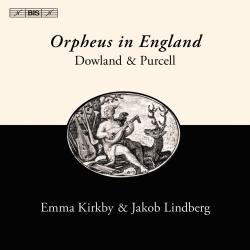 This
recording pairs Dowland with another composer who was also referred
to as �the English Orpheus� a hundred years later. Emma Kirkby
and Jakob Lindberg are as successful as you might imagine in
both composers and the recording is available in mp3, 16- and
24-bit formats from eclassical.com.
I recommended this in my review
of another Kirkby/Lindberg collaboration: The Queen�s Music
(BIS-CD-1715 � from eclassical.com
in mp3, 16- and 24-bit lossless); I misquoted the price of the
latter in that review, but at $9.91 it�s still very good value.
I made The Queen�s Music my Recording of the Month
and I see no reason to rate Orpheus in England less
highly.
This
recording pairs Dowland with another composer who was also referred
to as �the English Orpheus� a hundred years later. Emma Kirkby
and Jakob Lindberg are as successful as you might imagine in
both composers and the recording is available in mp3, 16- and
24-bit formats from eclassical.com.
I recommended this in my review
of another Kirkby/Lindberg collaboration: The Queen�s Music
(BIS-CD-1715 � from eclassical.com
in mp3, 16- and 24-bit lossless); I misquoted the price of the
latter in that review, but at $9.91 it�s still very good value.
I made The Queen�s Music my Recording of the Month
and I see no reason to rate Orpheus in England less
highly.
A Musicall Dreame: Ayres by Robert Jones, and instrumental
music by Giles Farnaby, John Dowland and John Coprario
Robert JONES (fl.1597-1615)
Though your strangeness frets my heart [4:39]
Sweet Kate [1:28]
Once did I serve a cruel heart [2:02]
Tobias HUME (?c1579-1645)
A Spanish Humour �The Lord Hayes� Favourite� [3:32]
Robert JONES Will said to
his mammy [3:08]
Tobias HUME Harke, harke
[1:34]
Robert JONES Hark! Wot ye
what? [4:20]
My complaining is but feigning [1:54]
Tobias HUME The King of
Denmark�s Health [1:52]
Robert JONES On a time in
summer season [3:59]
Farewell, fond youth [4:08]
John DOWLAND (1563-1626)
Lachrimæ [5:11]
Robert JONES Grief of my
best love�s absenting [3:52]
Giles FARNABY (c1563-1640) Giles
Farnaby�s Dream [1:55]
His Rest [1:00]
Robert JONES And is it night?
Are they thine eyes that shine? [2:33]
John DOWLANDFarnaby�s Conceit
[0:49]
His Humour [1:45]
Robert JONES Ite caldi
sospiri [2:06]
Angelo NOTARI (1566-1663) Intenerite
voi [2:58]
John DOWLAND Flow, my tears
[5:00]
John COPRARIO (c1570-1626) In
darkness let me dwell [3:02]
Michael Chance (counter-tenor), David Cordier (counter-tenor),
Stephen Stubbs (lute), Andrew Lawrence-King (harp), Erin Headley
(viol); Tragicomedia � rec. 1990. DDD.
Pdf booklet with texts included
HYPERION CDA66335 [62:47] � from Archive service or download
from hyperion-records.co.uk
(mp3 and lossless)
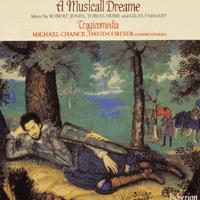 Despite
critical acclaim on its release, this is another casualty of
the deletions axe, saved only by Hyperion�s Archive Service
and, more recently, their download provision. Despite the title,
borrowed from Robert Jones, and the cover depiction of Edward,
first baron Herbert in fashionable melancholy/dreamy pose, you
don�t have to be in late-night mode to appreciate the music.
The performances and recording are excellent, the two countertenors
both blending yet remaining individual better than you might
imagine, and it�s very interesting to conclude with another
composer�s take on the words so closely associated with Dowland,
In darkness let me dwell; don�t be fooled by Coprario�s
Italianate name � he was actually plain John Cooper. The scanned
booklet is a bit rough and ready but perfectly adequate.
Despite
critical acclaim on its release, this is another casualty of
the deletions axe, saved only by Hyperion�s Archive Service
and, more recently, their download provision. Despite the title,
borrowed from Robert Jones, and the cover depiction of Edward,
first baron Herbert in fashionable melancholy/dreamy pose, you
don�t have to be in late-night mode to appreciate the music.
The performances and recording are excellent, the two countertenors
both blending yet remaining individual better than you might
imagine, and it�s very interesting to conclude with another
composer�s take on the words so closely associated with Dowland,
In darkness let me dwell; don�t be fooled by Coprario�s
Italianate name � he was actually plain John Cooper. The scanned
booklet is a bit rough and ready but perfectly adequate.
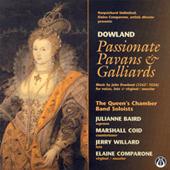 Lyrichord
offer three recordings of Dowland, all well worth considering
and all available in mp3 from classicsonline.com or streamed
from the Naxos Library, some with booklet and texts from both
sources. Passionate Pavans and Galliards (LEMS8046
[58:09]) sung by Julianne Baird (soprano) and Marshall Coid
(countertenor) with Elaine Comparone (virginal and muselar)
and the Queen�s Chamber Band/Jerry Willard (lute). I�ve praised
these performers, together or separately, in other repertoire
but, though I enjoyed this recording, made in 2000, and it won
an award, some of the singing is less than secure. (The Lyrichord
website
will allow you to try track 1, Clear or cloudy, for the
best and track 4, Flow, my tears, for this recital at
its least good.)
Lyrichord
offer three recordings of Dowland, all well worth considering
and all available in mp3 from classicsonline.com or streamed
from the Naxos Library, some with booklet and texts from both
sources. Passionate Pavans and Galliards (LEMS8046
[58:09]) sung by Julianne Baird (soprano) and Marshall Coid
(countertenor) with Elaine Comparone (virginal and muselar)
and the Queen�s Chamber Band/Jerry Willard (lute). I�ve praised
these performers, together or separately, in other repertoire
but, though I enjoyed this recording, made in 2000, and it won
an award, some of the singing is less than secure. (The Lyrichord
website
will allow you to try track 1, Clear or cloudy, for the
best and track 4, Flow, my tears, for this recital at
its least good.)
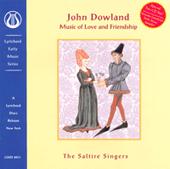 Russell
Oberlin (counter-tenor) and Joseph Iadone (lute) perform an
attractive selection of Dowland Lute Songs on LEMS8011
[47:07]. Only the short playing time and some slightly precious
pronunciation left me with marginally less than the highest
opinion of this album. Though recorded as long ago as 1958,
the sound is fresh and clear.
Russell
Oberlin (counter-tenor) and Joseph Iadone (lute) perform an
attractive selection of Dowland Lute Songs on LEMS8011
[47:07]. Only the short playing time and some slightly precious
pronunciation left me with marginally less than the highest
opinion of this album. Though recorded as long ago as 1958,
the sound is fresh and clear.
The Saltire Singers with David Dupré (lute) are also
impressive in Music of Love and Friendship on
Lyrichord LEMS8031
[41:17] though the playing time is even shorter on this album.
They offer a selection of the three Books of Songs and their
1612 successor, A Pilgrim�s Solace, performed as part
songs. The blend of voices is remarkable and the recording does
them full justice. It�s a shame that the cover picture dates
from an earlier century than Dowland.
The doyen of Dowland�s lute music was Julian Bream; I�m pleased
to see that The Golden Age of Lute Music, including Byrd,
Dowland et al. has survived the deletions axe which seems to
have descended on RCA�s Julian Bream Edition � at least some
dealers still have the CD, though I don�t think it�s available
for download. (09026615842). I see that amazon.co.uk
are asking over £37 for the music by Byrd, Cutting et
al. on The Woods so Wild from this series, which ought
to send a message to BMG Sony about potential sales if they
restored the whole Bream edition.
Nigel North has made a well-liked series of recordings of Dowland�s
lute music for Naxos, all available inexpensively from classicsonline.com
� see my review
of Volume Three (8.570449), with links to Volumes 1 and
2 and details of alternative recordings. I made Volume 4 my
Recording of the Month (8.570284 � review).
Unwilling to leave it at that, I reviewed the download of Volume
2 and a Naxos 2-CD anthology featuring Nigel North and others
(Burst forth my Tears, 8.578015/6) in the July
2009 Roundup.
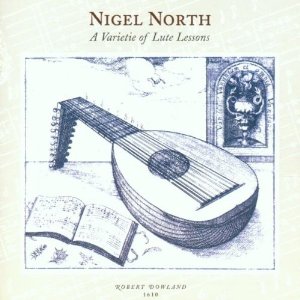
My brief review of Nigel North�s two earlier recordings of Dowland
and his contemporaries for Linn in the April 2009 Roundup is
not accessible at the moment � a technical glitch leads you
to the May 2009 edition if you click on the index.
These two albums deserve more detailed treatment but suffice
it for the moment that both are excellent and available as downloads
in mp3 and lossless sound:
– A Varietie of Lute Lessons (1610): CKD097
� music by John and Robert Dowland, the �Knight of the Lute�,
Holborne, Ballard, Batchelar, Morley, Ferrabosco, et al. [77:52]
� from linnrecords.com
(HDCD, mp3 and lossless)
– Go from my Window: CKD176 � music by Byrd,
Cutting, Dowland et al. [66:00] � from linnrecords.com
(SACD, mp3 and lossless)
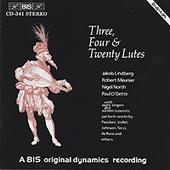 Never
one to resist side-tracking, I must mention another very enjoyable
recording from 1986, mostly of dance music, featuring Nigel
North, Jakob Lindberg, Paul O�Dette and umpteen others lutenists
and singers: Three, Four & Twenty Lutes (BIS
BIS-CD-341 [52:38]) � download, with booklet, from eclassical.com
(mp3 and lossless) or stream from Naxos Music Library.
Never
one to resist side-tracking, I must mention another very enjoyable
recording from 1986, mostly of dance music, featuring Nigel
North, Jakob Lindberg, Paul O�Dette and umpteen others lutenists
and singers: Three, Four & Twenty Lutes (BIS
BIS-CD-341 [52:38]) � download, with booklet, from eclassical.com
(mp3 and lossless) or stream from Naxos Music Library.
If your appetite is not yet sated, though it contains some inevitable
overlaps with recommendations already made, there�s:
Sypres Curten of the Night: Elizabethan & Jacobean
Lute Songs
Thomas CAMPION Never weather-beaten
sail [2:08]; Author of light [2:54]; The Sypres Garden of the
Night [6:28]
Thomas FORD Since first
I saw your face [2:52]; Faire, sweet, cruell [2:12]; What then
is love sings Coridon [3:25]
Anthony HOLBORNE Heres
paternus [5:15]
John DANYEL Griefe keepe
within [2:27]; Drop not mine eies [2:33]; Have all our passions
[2:40]
Philip ROSSETER What then
is love but mourning? [1:59]; Shall I come if I swim? [1:44];
No grave for woe [3:16]
Anthony HOLBORNE
The night watch [1:35]; Muy linda [1:15]
John DOWLAND I saw my lady
weepe [5:42]; Shall I strive with wordes to move? [2:40]; Sorrow,
stay [3:29]; Can she excuse my wrongs? (First Booke of Songes,
1597) [2:36]
Anthony HOLBORNE Fantasia
[1:54]
Anon. Miserere, my Maker [4:36]
Michael Chance (counter-tenor), Christopher Wilson (lute)
Pdf booklet with texts included
CHANDOS CHACONNE CHAN0538 [65:09] � from theclassicalshop.net
(mp3 and lossless)
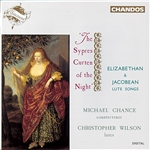 In
fact there�s just enough here that isn�t otherwise available
to make this recommendable in addition to the other recordings.
Otherwise, with excellent singing, sensitive accompaniment,
good recording, especially in lossless format, and informative
notes and texts, this would be worth considering as an alternative.
In
fact there�s just enough here that isn�t otherwise available
to make this recommendable in addition to the other recordings.
Otherwise, with excellent singing, sensitive accompaniment,
good recording, especially in lossless format, and informative
notes and texts, this would be worth considering as an alternative.
* �He whom fortune has not blessed either rages or weeps�.
** I mean the word in its proper sense � the painter�s imagination
has captured the man�s whole life in depicting his funeral.
Johann Heinrich SCHEIN (1586-1630)
Israels Brünnlein (the Fountains of Israel, 1623)
Dresdener Kammerchor/Hans-Christoph Rademann
CARUS 83.350 [46:58 + 47:19] � from classicsonline.com
(mp3)
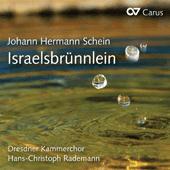 Some
time ago, reviewing a Capriccio reissue of Israels Brünnlein
� August 2011/2 Roundup
� I found myself wishing for the reissue of the stylish and
stylish presented performances of a selection from Cantus Cölln
on Deutsche Harmonia Mundi. I hadn�t noticed that it had been
reissued at budget price on 0886975688029. I�d also forgotten
these two albums from Carus, formerly available separately and
now reissued as a set, though with no price benefit as far as
the download is concerned*. The performances fall between the
rather severe style of the Capriccio and the madrigal-like performances
on DHM. I still prefer the latter � the title page specifically
refers to the music as in einer Italian madrigalischen Manier,
in the style of Italian madrigals � but the Carus makes a more
than acceptable substitute. The recording is good, but there�s
no booklet, so no texts; those with access to the Naxos Music
Library will be able to access them from the Capriccio booklet.
Some
time ago, reviewing a Capriccio reissue of Israels Brünnlein
� August 2011/2 Roundup
� I found myself wishing for the reissue of the stylish and
stylish presented performances of a selection from Cantus Cölln
on Deutsche Harmonia Mundi. I hadn�t noticed that it had been
reissued at budget price on 0886975688029. I�d also forgotten
these two albums from Carus, formerly available separately and
now reissued as a set, though with no price benefit as far as
the download is concerned*. The performances fall between the
rather severe style of the Capriccio and the madrigal-like performances
on DHM. I still prefer the latter � the title page specifically
refers to the music as in einer Italian madrigalischen Manier,
in the style of Italian madrigals � but the Carus makes a more
than acceptable substitute. The recording is good, but there�s
no booklet, so no texts; those with access to the Naxos Music
Library will be able to access them from the Capriccio booklet.
* that�s a double pity, because, along with the lack of libretto,
it prevents me from making this Reissue of the Month when hmvdigital.com
are currently offering the set for the price of one album, £7.99,
again without the booklet.
Francesso CAVALLI (1602-1676)
Il Giasone: Dramma per musica in prologue and three acts
(1649)
Libretto by Ginacinto Andrea Cicognini
Score revised by Alexander Krampe
Christophe Dumaux (counter-tenor, Giasone)
Katarina Bradic (soprano, Medea)
Robin Johannsen (soprano, Isifile)
Josef Wagner (bass, Giove/Besso)
Filippo Adami (tenor, Demo)
Yaniv d�Or (contralto, Delfa/Eolo)
Angélique Noldus (soprano, Amore/Alinda)
Andrew Ashwin (bass, Ercole/Oreste)
Emilio Pons (tenor, Egeo/Sole)
Symfonisch Orkest van de Vlaamse Opera/Federico Maria Sardelli
� rec. May 2010.
DYNAMIC CDS663 [3 CD: 3:11:05] � from hmvdigital.com
(mp3) or stream from Naxos Music Library.
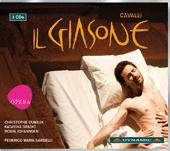 I�ve
been trying with difficulty to formulate a measured response
to the DVD version of this recording (Dynamic 33663).
I�m pleased to have the opera complete on record* and generally
more than happy with the singing, orchestral support and musical
direction, but the production is something of a hotch-potch;
as is all too frequent nowadays it�s more annoying than enlightening,
with silly costumes � rabbits� ears for Hercules and a Popeye
sailor suit for Jason � so I�m likely to find myself listening
and not watching in future, in which case you may well wish
to save yourself the £30 or so that the DVD and Blu-ray
will cost you and settle for the hmvdigital.com download for
considerably less (£7.99), though that means doing without
the subtitles of the DVD � there�s no libretto with the download,
but there is a synopsis from BBC Radio 3 here
and a more detailed one from Wikipedia here,
where you will also find a link to the Italian text. It�s hardly
common or garden modern Italian, however, so you�ll need some
assistance from the synopses.
I�ve
been trying with difficulty to formulate a measured response
to the DVD version of this recording (Dynamic 33663).
I�m pleased to have the opera complete on record* and generally
more than happy with the singing, orchestral support and musical
direction, but the production is something of a hotch-potch;
as is all too frequent nowadays it�s more annoying than enlightening,
with silly costumes � rabbits� ears for Hercules and a Popeye
sailor suit for Jason � so I�m likely to find myself listening
and not watching in future, in which case you may well wish
to save yourself the £30 or so that the DVD and Blu-ray
will cost you and settle for the hmvdigital.com download for
considerably less (£7.99), though that means doing without
the subtitles of the DVD � there�s no libretto with the download,
but there is a synopsis from BBC Radio 3 here
and a more detailed one from Wikipedia here,
where you will also find a link to the Italian text. It�s hardly
common or garden modern Italian, however, so you�ll need some
assistance from the synopses.
The vocal contributions are something of a mixed bunch but Sardelli�s
direction is delightful; on DVD the array of continuo instruments
� a viol, two lutes and two harpsichords � adds to the delight
and they contribute to making the orchestra sound much plusher
than would otherwise be the case. Be warned that there�s a fair
amount of stage noise � this was a �busy� production. Try it
out first from the invaluable Naxos Music Library if you can,
where you can also find a synopsis. Overall, whichever version
you choose, I think you�ll be won over by the sheer fun.
* It�s not actually the first recording; there�s a Harmonia
Mundi version conducted by René Jacobs, no longer available
on CD, but as a download from hmvdigital.com
for just £7.99, albeit at a bit-rate of only 192 kb/s.
Johann Sebastian BACH (1685-1750)
Fantasia and fugue in c minor, BWV537 (arr. Sir Edward ELGAR)
London Symphony Orchestra/Albert Coates � rec. 1928. ADD/mono
(78s)
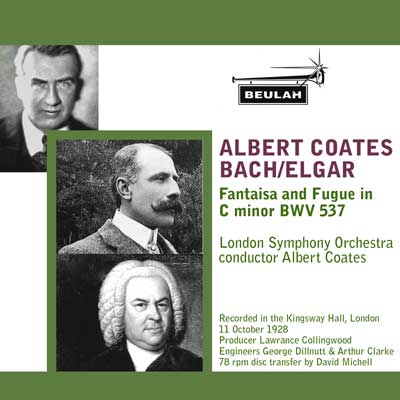 BEULAH
EXTRA 9BX124 [7:01] � from eavb.co.uk
(mp3)
BEULAH
EXTRA 9BX124 [7:01] � from eavb.co.uk
(mp3)
This recording was reissued by Koch on two CDs in 1993, along
with several other Albert Coates vintage recordings, but that
set has disappeared, leaving Beulah in sole possession on CD
(Visions of Elgar, 14PD15, 4 CDs � review).
Collectors will be pleased to note its separate availability
now � there�s real fire in the belly of this performance � but
the recording is just too dated for me to appreciate, despite
all that Beulah have done to maximise the quality of the transfer.
Wolfgang Amadeus MOZART (1756-1791)
Clarinet Concerto in A, K622 [29:31]
Horn Concerto No.1 in D, K412/K514 [8:49]
Horn Concerto No.3 in E-flat, K447 [15:23]
Gervase de Peyer (clarinet); Barry Tuckwell (horn); London Symphony
Orchestra/Peter Maag � rec.c.1959. ADD.
DISCOVER CLASSICAL MUSIC [53:43] � from emusic.com
(mp3)
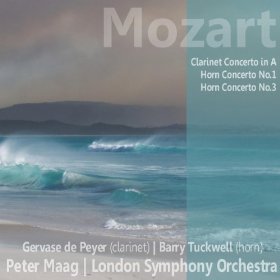 Australian
Decca have reissued the Gervase de Peyer recording on Eloquence
476 7404 (with Spohr and Weber) and his earlier (1954)
recording with Anthony Collins on 480 3608 (with the
Bassoon Concerto and Flute Concerto No.2 � review),
but price increases have left that label, once at super-budget
price, much more expensive in the UK, so Discover and emusic.com
together offer an inexpensive alternative. Both of the de Peyer
versions of the Clarinet Concerto have strong claims to benchmark
status and Barry Tuckwell�s recording of the two of the horn
concertos is not far behind.
Australian
Decca have reissued the Gervase de Peyer recording on Eloquence
476 7404 (with Spohr and Weber) and his earlier (1954)
recording with Anthony Collins on 480 3608 (with the
Bassoon Concerto and Flute Concerto No.2 � review),
but price increases have left that label, once at super-budget
price, much more expensive in the UK, so Discover and emusic.com
together offer an inexpensive alternative. Both of the de Peyer
versions of the Clarinet Concerto have strong claims to benchmark
status and Barry Tuckwell�s recording of the two of the horn
concertos is not far behind.
The recordings in this transfer sound reasonable � there�s no
trace of surface noise apart from some analogue tape hiss, but
some of the transients sound less than pure and there�s not
much stereo information. All in all this is an inexpensive way
to obtain some classic recordings. For a better transfer (320kb/s
mp3) of all the Tuckwell/Maag horn concertos plus the fragment
in E, KAnh98A, hmvdigital.com offer the Decca Originals for
£4.99, which is better value than their version of the
Discover Classical Music release � at £6.32 against emusic.com�s
£3.36 or less.
The 1954 de Peyer/Collins Clarinet Concerto is also available
for £1.50 from Beulah (1BX45
� see November 2010 Roundup).
Wolfgang Amadeus MOZART
Symphony No.33 in B-flat, K319
Concertgebouw Orchestra/Eduard van Beinum � rec. c.1952. ADD/mono
Symphony No.35 in D, K385, Haffner
London Philharmonic Orchestra/Eduard van Beinum � rec. c. 1950.
ADD/mono
BEULAH EXTRA 22-25BX37 [20:23] and 18-21BX37 [17:09]
� from eavb.co.uk
(mp3)
These recordings were supplied for review with the Beulah September
2012 releases but you may have to wait another month or so for
the link above to be valid.
Van Beinum�s Symphony No.33 first appeared in 1952 in tandem
with Haydn (Symphony No.94). The Haffner is from a little
earlier, when it was coupled with Handel�s Water Music
Suite. No.33 received a fairly warm welcome, the Haffner
slightly less so, with a suggestion that the power of the music
was brought out at the expense of grace.
Nowadays we�re less apt to think of Mozart as the musical equivalent
of a Meissen figurine and I enjoyed van Beinum�s way with the
Haffner a good deal more than my 1950 predecessor. Among
�old-school� recordings of this symphony it�s not going to replace
Bruno Walter�s mono LP and later stereo recordings, but these
are available now only in multi-CD boxes from Sony and Andromeda.
The recording sounds a bit scrawny, but no more so than you
might expect for a recording of this vintage; there�s no significant
surface noise on this transfer and the ear soon adjusts to the
sound quality. There�s a sample on YouTube � here.
The difference of a couple of years is apparent in the much
improved sound of No.33. This, too, I enjoyed hearing alongside,
though not in preference to, more recent recordings such as
that of Sir Charles Mackerras with the Prague Chamber Orchestra
on Telarc (Nos. 31, 33 and 34, CD80190). Mackerras�s
tempi are, surprisingly, just a little slower than Beinum�s;
in the finale he�s more generous with repeats.
Wolfgang Amadeus MOZART
Apollo et Hyacinthus (Latin intermedium 1767)
Klara Ek (Melia, soprano), Sophie Bevan (Hyacinthus, soprano),
Lawrence Zazzo (Apollo, counter-tenor), Christopher Ainslie
(Zephyrus, counter-tenor), Andrew Kennedy (Oebalus, tenor),
Marcus Farnsworth, David Shipley (baritone, bass, Priests of
Apollo)
Classical Opera/Ian Page � rec. August 2011. DDD.
Pdf booklet with texts and translations included.
LINN CKD398 [76:38] � from linnrecords.com
(mp3, 16- and 24-bit lossless)
[�[a] splendid version of an unfairly neglected work�: see review
by John Sheppard: Recording of the Month.]
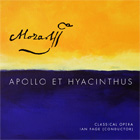 What
a wonderful achievement for a boy hardly old enough to attend
the grammar school for which the entertainment was intended.
I seem to have been laggard in getting round to this recording
� so much praise has been lavished on it, not least by our own
John Sheppard, that I can only echo what they have written and
confirm that the download is every bit as good as the disc.
In one important respect, indeed, it�s even better because it�s
available in a variety of 24-bit lossless versions at a price
that won�t put too much strain on your wallet or purse. The
only possible reason to prefer the older recording conducted
by Max Pommer, with generally slower tempi, on Berlin Classics
is that it comes with Bastien und Bastienne on an inexpensive
2-CD set (0183702BC, £9.98 from classicsonline.com
� see review
of the same performance on Brilliant Classics).
What
a wonderful achievement for a boy hardly old enough to attend
the grammar school for which the entertainment was intended.
I seem to have been laggard in getting round to this recording
� so much praise has been lavished on it, not least by our own
John Sheppard, that I can only echo what they have written and
confirm that the download is every bit as good as the disc.
In one important respect, indeed, it�s even better because it�s
available in a variety of 24-bit lossless versions at a price
that won�t put too much strain on your wallet or purse. The
only possible reason to prefer the older recording conducted
by Max Pommer, with generally slower tempi, on Berlin Classics
is that it comes with Bastien und Bastienne on an inexpensive
2-CD set (0183702BC, £9.98 from classicsonline.com
� see review
of the same performance on Brilliant Classics).
The new recording, promised as the first of a series, joins
a select list of fine Mozart albums from this stable:
– Symphonies Nos. 29, 31, 32, 35 and 36: Scottish Chamber
Orchestra/Sir Charles Mackerras CKD350 � April 2010 Roundup
– Symphonies Nos. 38-41: Scottish Chamber Orchestra/Sir
Charles Mackerras CKD308 � January 2009 Roundup
– Divertimento No.17, K334; Oboe Quartet: Scottish Chamber
Orchestra Ensemble CKD287 � review
– Mozart in Vienna: Gottlieb Wallisch (piano) CKD352
� August 2010 Roundup
Wolfgang Amadeus MOZART
Die Zauberflöte (The Magic Flute), K620
Maria Stader (soprano) Pamina;
Rita Streich (soprano) Queen of Night;
Ernst Haefliger (tenor) Tamino;
Dietrich Fischer-Dieskau (baritone) Papageno;
Josef Greindl (bass) Sarastro;
Kim Borg (bass) Speaker, Second Armed Man;
Martin Vantin (tenor) Monostatos;
Lisa Otto (soprano) Papagena;
Marianna Schech (soprano) First Lady;
Liselotte Losch (soprano) Second Lady;
Margarete Klose (mezzo-soprano) Third Lady;
Margot Guifleaume (soprano) First Boy;
Maria Reith (soprano) Second Boy;
Diana Eustrati (contralto) Third Boy;
Howard Vandenburg (tenor) First Armed Man, Priest;
Berlin RIAS Chamber Choir and Orchestra/Ferenc Fricsay � rec.1954
NAXOS CLASSICAL ARCHIVES 9.80720/1 [2:22:46] � from classicsonline.com
or emusic.com
(mp3) or stream from Naxos Music Library (not available in the
USA).
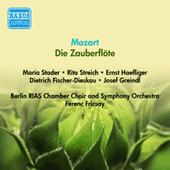 This
is one of the all-time benchmarks for this wonderful opera.
The cast is ideal � not least the youthful Dietrich Fischer-Dieskau
as Papageno � and the direction is thoroughly idiomatic. I prefer
Zauberflöte without dialogue, especially as the
actor�s voices here sound nothing like those of the relevant
singers, and the recording is in mono, but it still sounds well,
spread across two speakers. Overall it�s rather better than
the Past Classics transfer which I recommended in the June 2012/1
Roundup,
though that benefits from having had the dialogue edited out.
This
is one of the all-time benchmarks for this wonderful opera.
The cast is ideal � not least the youthful Dietrich Fischer-Dieskau
as Papageno � and the direction is thoroughly idiomatic. I prefer
Zauberflöte without dialogue, especially as the
actor�s voices here sound nothing like those of the relevant
singers, and the recording is in mono, but it still sounds well,
spread across two speakers. Overall it�s rather better than
the Past Classics transfer which I recommended in the June 2012/1
Roundup,
though that benefits from having had the dialogue edited out.
Of recordings of this vintage only Klemperer has a greater claim
� no dialogue at all, which I prefer, and an unbeatable cast,
with star singers even in the roles of the Three Ladies. Hmvdigital.com
have the latest reissue of that (EMI Opera 9667932 �
review
of earlier reissue) for £7.99.
For a mere £1.26 emusic.com are practically giving this
classic Fricsay recording away; for those who don�t have membership,
classicsonline.com offer it at £3.98, which is still excellent
value. Quite why amazon.co.uk are charging £14.98 is beyond
me. As the Overture, Act I and Act II are each complete on one
track, it�s possible to burn this as one mp3 disc and still
have plenty of room to spare without risk of gaps in the music.
There�s no libretto, but there�s a limit to what one can expect
for £1.26 and it�s easily available online.
Ludwig van BEETHOVEN (1770-1827)
Beethoven for All
Symphonies Nos.1-9
Anja Harteros (soprano), Waltraud Meier (mezzo), Peter Seiffert
(tenor), René Pape (bass)
Vokalensemble Kölner Dom � rec. Cologne, August 2011. DDD.
West-Eastern Divan Orchestra/Daniel Barenboim
DECCA 478 3511 or UNIVERSAL/LINN UNI030 [5 CDs:
353:14] � from linnrecords.com
(mp3, 16- and 24-bit lossless)
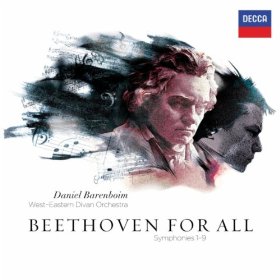 I
believe there will be three sets of reactions to these performances,
some of them formulated by those who have followed Daniel Barenboim�s
Beethoven symphony series at the 2012 Proms even before hearing
the recordings: those who love his old-fashioned approach, those
who hate it and others like myself who enjoy it mostly but find
themselves shaking their heads at times and applauding at others.
Even in that third category, not everyone will share my preference
for Barenboim in lighter mode in Nos. 1, 2, 4 and 7. All in
all, then, this is a mixed blessing. If you want to try in advance,
the finale of No.5 is included on the free Linn sampler which
I reviewed in the August 2012/2 Roundup.
I
believe there will be three sets of reactions to these performances,
some of them formulated by those who have followed Daniel Barenboim�s
Beethoven symphony series at the 2012 Proms even before hearing
the recordings: those who love his old-fashioned approach, those
who hate it and others like myself who enjoy it mostly but find
themselves shaking their heads at times and applauding at others.
Even in that third category, not everyone will share my preference
for Barenboim in lighter mode in Nos. 1, 2, 4 and 7. All in
all, then, this is a mixed blessing. If you want to try in advance,
the finale of No.5 is included on the free Linn sampler which
I reviewed in the August 2012/2 Roundup.
My first impression from hearing that excerpt and subsequently
to Nos. 2 and 4 from Spotify was that the �big� symphonies were
being given meaty treatment while the other works, mainly the
even-numbered symphonies, were given a lighter treatment. At
first I thought the Eroica might be the exception, as
it opens in a fairly light manner, but it�s not long before
Barenboim hammers � or rather drums � home the point that this
is Significant Music. Of course the work lends itself to a large-scale
treatment but in this category I prefer Klemperer, preferably
his earlier mono recording (EMI 5677402 or Naxos 8.111303:
see March 2010 Roundup
� download either from classicsonline.com in mp3), though the
stereo makes a good alternative. The recording, naturally, is
no match for the new Decca, especially in 24-bit format, but
it�s still more than satisfactory.
There�s actually very little difference in stopwatch terms between
Klemperer (mono) and Barenboim in the opening movement of the
Eroica � just 17 seconds on paper � but my recollection
that Klemperer keeps the music moving better and there�s more
sense of brio, and general lightness is confirmed by
hearing the two one after the other. Even the stereo remake,
though almost a minute longer than the mono, achieves the same
effect, and the recording is also worth having for the orchestra
transcription of the Grosse Fuge. (No longer available
on CD? Download from classicsonline.com.)
Again in the second movement funeral march, Barenboim is about
a minute slower than Klemperer (mono) but sounds even heavier
than that difference implies. Now that the exigencies of LP
timings no longer require a turn-over in the middle of the movement,
it�s a real pleasure to hear Klemperer and more of a duty to
listen to the new recording. Barenboim�s admiration for Furtwängler
is well known; though he moves the music along faster than his
hero, who really lets this movement drag on his recording with
the VPO (EMI Références- download from classicsonline.com,
with No.1), I thought the pace too funereal, if that�s not a
paradox in a funeral march.
In the finale Barenboim captures the dance rhythms effectively
� this time his tempo is considerably faster than either Klemperer
recording � but with too much rubato and rather too many attempts
to caress the music; it doesn�t need them to be quite so obvious.
If I have a desert-island Beethoven symphony, it�s the Seventh,
and the benchmark in my head is Colin Davis�s 1961 HMV recording
with the RPO, now happily restored to us by Beulah (15-18BX129
� see February 2012/1 Roundup).
I enjoyed Barenboim�s recording pretty well unreservedly, with
Wagner�s famous description of the work as the apotheosis of
the dance well in mind; perhaps the end of the third movement
is a little too slow. At 6:58 he is marginally slower than Davis
in the finale; Bruno Walter, whose NYPO mono LP recording has
been reissued by Archipel, nearly comes off the rails at 6:24;
he�s just a little too dangerously fast in this movement, which
both Davis and Barenboim avoid without losing a sense of urgency.
All Beethoven symphony cycles, of course, lead up to the Ninth
and especially to its choral finale, but this does so more than
most � I�ve even seen it suggested, quite feasibly, that Barenboim
thought out his approach from the Ninth backwards. Once again
this is a big-boned performance right from the outset and will
delight those who, like the possibly apocryphal music student
who told his professor that Beethoven wrote three symphonies,
the Third, the Fifth and the Ninth, view those works as the
cornerstones of his symphonic achievement.
Big-boned works well here, of course, which is why the Ninth
is arguably the least successful in Emmanuel Krivine�s period-performance
set for Naïve (V5258 � see July 2011/1 Roundup;
separately available on V5202) and why Sir Charles Mackerras
chose to move up from the Scottish Chamber Orchestra to the
Philharmonia for this one work in his Edinburgh Festival cycle
(Hyperion CDS44301/5 � March 2010 Roundup).
I did, nevertheless, find Barenboim heavy going in all but the
second movement. Even if you eschew period instruments here,
there is a middle way between the likes of Krivine and Barenboim
and it�s to be found in two performances which have become my
benchmarks for the Choral Symphony, Mackerras and Osmo Vänskä
(BIS-SACD-1616* � March 2010 Roundup),
both with modern orchestras, and both much lighter in touch
than Barenboim. Comparative timings tell some of the story:
| Barenboim |
Vänskä |
Mackerras |
Krivine |
| 17:07 |
14:45 |
14:14 |
14:29 |
| 12:21 |
13:26 |
13:18 |
13:30 |
| 16:43 |
14:08 |
12:41 |
12:24 |
| 25:36 |
23:29 |
21:17 |
22:59 |
Barenboim�s dancing account of the second movement,
which makes it sound like kith and kin to the Seventh Symphony,
almost persuaded me in favour of his overall interpretation,
but the magic fades again after that. The opening of the third
movement, though marked adagio molto, is surely meant
to be taken a little faster than this; even Klemperer managed
to take only around 15 minutes with the Philharmonia � less
still in his earlier Vox recording. A degree of compensation
comes from the way that Barenboim�s players achieve the cantabile
part of the marking as well as any that I�ve heard. The magic
used to be shattered on single-LP versions by having to turn
over part-way through this movement; that would destroy the
mood of this performance pretty well completely, but I doubt
if this version would ever have fitted on one LP. The finale
is again a little too ponderous, though the bouncy orchestral
playing lifts the mood and the quartet of soloists and the choir
generally give of their best.
It�s a mixed bag, then, so I�m tempted to recommend that you
pick and choose � you�ll find details from the Beethoven
for All website
of the separate single-CD and even single-symphony releases
� but Barenboim�s Beethoven is really all of a piece and best
savoured as such. In any case, the Linn download of the complete
set is available at a very reasonable price, ranging from £18
for 320kb/s mp3 to £30 for the 24/96 Studio Master; that
compares very favourably with the prices ranging from around
£27 to £36 being asked for the CD set. There�s no
booklet but that�s a minor consideration when the 24/44.1 and
24.96 versions come in sound quality superior to CD if your
system can handle them. The 24-bit download is excellent, with
plenty of dynamic range, though that brings its own problems
� at times in the finale of the Ninth the sound almost seems
to disappear at listening levels which are comfortable for the
rest of the symphony.
Glutton for punishment as he is, Barenboim will be releasing
further instalments in the Beethoven for All series,
with the Piano Concertos and Sonatas and a TV documentary �
a 2-CD sampler has already appeared on 478 3513.
* Download from eclassical.com
in mp3, 16- and 24-bit lossless sound. Vänskä�s complete
cycle on BIS is also a strong contender for the �best buy� (BIS-SACD-1825/26:
5 SACDs for the price of two) alongside Mackerras (CDS44301/5,
also available on CD and as a download at a special price).
Johannes BRAHMS (1833-1897)
Piano Concerto No.1 in d minor, Op.15
Claudio Arrau (piano); Philharmonia Orchestra/Carlo Maria Giulini
� rec.1960. ADD/stereo
BEULAH EXTRA 4-6BX8 [51:28] � from eavb.co.uk
(mp3)
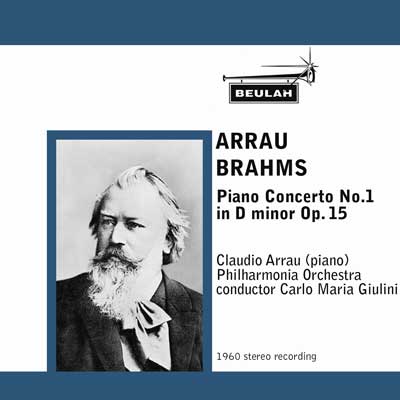 Brahms
leaves no doubt at the start of this concerto that it�s going
to be a large symphonic-scale work � his First Symphony, for
which it was in some senses a trial run, was still 63 opus numbers
in the future � as he struggled from beneath the shadow of Beethoven,
not wholly successfully as it turned out. Even when the soloist
enters in rather softer vein, the feeling continues that this
is going to be a big-boned performance; it�s an interpretation
of an aspect of Brahms that is certainly defensible. It�s not
all in the same manner; there�s some tender playing, too, especially
from Claudio Arrau, and I enjoyed hearing it, though I wouldn�t
choose it as my main recording. The other side of the coin however,
is that some � Edward Greenfield, no less, for one, in 1961
� have found it stodgy.
Brahms
leaves no doubt at the start of this concerto that it�s going
to be a large symphonic-scale work � his First Symphony, for
which it was in some senses a trial run, was still 63 opus numbers
in the future � as he struggled from beneath the shadow of Beethoven,
not wholly successfully as it turned out. Even when the soloist
enters in rather softer vein, the feeling continues that this
is going to be a big-boned performance; it�s an interpretation
of an aspect of Brahms that is certainly defensible. It�s not
all in the same manner; there�s some tender playing, too, especially
from Claudio Arrau, and I enjoyed hearing it, though I wouldn�t
choose it as my main recording. The other side of the coin however,
is that some � Edward Greenfield, no less, for one, in 1961
� have found it stodgy.
I deliberately played this �blind� but Arrau was certainly one
of the pianists I would have guessed; I almost always enjoyed
his performances and this is more sensitive than those which
sometimes led reviewers to pun on his name and the word �row�.
Those who fall into the anti-Arrau camp, and even those who,
like me, don�t, might well prefer Clifford Curzon�s stereo remake
from much the same vintage (Decca Heritage 478 1386,
budget price, with the Second Piano Concerto) or, perhaps better
still, Emil Gilels and Eugen Jochum in the two Brahms concertos
on a DG Originals twofer (447 4462). You�re likely to
find both these sets less expensively on CD than as downloads.
EMI have reissued the Arrau/Giulini recordings of both Brahms
concertos in a budget 3-CD pack (The Concerto Album 5094212
� see review
by Rob Maynard, who, like me, enjoyed the delicacy of some of
Arrau�s playing), but Beulah offer the only way of obtaining
the First Concerto on its own and at an economical price. The
recording still sounds well in this transfer.
Antonín DVOŘÁK
(1841-1904)
Slavonic Dances, Series 1, Op.46/B.83/8 in g minor [4:37]
Symphony No. 7 in d minor, Op.70/B.141[36:47]
In Nature�s Realm, Op.91/B.168 [15:04]
Scherzo capriccioso, Op.66/B.131 [15:37]
Bournemouth Symphony Orchestra/José Serebrier � rec.
2010? DDD.
WARNER CLASSICS 825646665488 [72:05] � from classicsonline.com
(mp3) or stream from Naxos Music Library
Symphony No. 8 in G, Op. 88/B.163 (1889) [36:50]
Zlat´y kolovrat (The Golden Spinning Wheel), symphonic
poem, Op. 109/B.197 (1896) [27:02]
Scherzo capriccioso, Op. 66/B.131 (1883) [14:36]
Malaysian Philharmonic Orchestra/Claus Peter Flor � rec. September
2010 and July 2011. DDD.
Pdf booklet included.
BIS-SACD-1976 [79:28] � from
eclassical.com (mp3, 16- and 24-bit lossless)
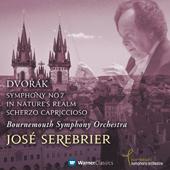 José
Serebrier�s earlier recording of the New World Symphony
didn�t quite have me jumping for joy, but I thought it a fairly
strong competitor in a crowded market � see November 2011 Roundup.
The new recording of No.7 comes into more or less the same category:
nothing here had me leaping up in anger and I enjoyed the performance,
but equally I didn�t discover any fresh insights into this symphony.
A liltingly sensitive performance of In Nature�s Realm adds
to the attraction. As before, Dvořák in dance mode
is emphasised; a lively Slavonic Dance is placed to the fore
and a too languid account of the Scherzo capriccioso
aft of the main menu. Serebrier is slower in the Scherzo than
Jiří Bělohl�vek (Chandos CHAN9475, with
Symphony No.5 and The Noon Witch)* and the difference
is more significant than the mere 51 seconds on paper.
José
Serebrier�s earlier recording of the New World Symphony
didn�t quite have me jumping for joy, but I thought it a fairly
strong competitor in a crowded market � see November 2011 Roundup.
The new recording of No.7 comes into more or less the same category:
nothing here had me leaping up in anger and I enjoyed the performance,
but equally I didn�t discover any fresh insights into this symphony.
A liltingly sensitive performance of In Nature�s Realm adds
to the attraction. As before, Dvořák in dance mode
is emphasised; a lively Slavonic Dance is placed to the fore
and a too languid account of the Scherzo capriccioso
aft of the main menu. Serebrier is slower in the Scherzo than
Jiří Bělohl�vek (Chandos CHAN9475, with
Symphony No.5 and The Noon Witch)* and the difference
is more significant than the mere 51 seconds on paper.
At £6.99 classicsonline.com downloads of full-price Warner
releases are very good value. Those in search of even better
value, however, should bear in mind Marin Alsop�s recordings
of Symphonies Nos. 7 and 8 on Naxos 8.572112, yours for
£4.99, again from classicsonline.com. Her version of No.7
caught my attention more than her Eighth, and two of my colleagues
also had reservations � review
and review.
You�ll find my thoughts on that recording and other versions
of the Seventh (coupled in some cases with the Eighth) in the
May 2012/1 Roundup,
where you�ll also find Dan Morgan�s review of the recent BIS
recording of No.7 from Claus Peter Flor. Of all the versions
discussed there my Desert Island choice would be Iván
Fischer with the American Suite, on Channel Classics
CCSSA30010.
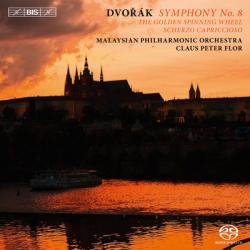 Claus
Peter Flor�s series of the symphonies with the Malaysian
Orchestra now moves on to an impressive version of No.8, far
more idiomatic than the version which he made with the RPO for
RCA several years ago. If anything, competition in No.8 is even
fiercer than in its predecessor, with a classic recording from
Rafael Kubelík (DG Originals 447 4122) and a more
recent SACD from Iván Fischer (Channel Classics CCSSA90110)
heading the list for quality and value � both couple Nos. 8
and 9. You�ll find appreciative reviews of the Fischer recording
in its earlier Philips incarnation from John Quinn � here
� and from me in the July 2010 Roundup.
You�ll also find from that July 2010 Roundup that I thought
Marin Alsop excellent value on Naxos (8.572112) � still
only £4.99 from classicsonline.com.
Claus
Peter Flor�s series of the symphonies with the Malaysian
Orchestra now moves on to an impressive version of No.8, far
more idiomatic than the version which he made with the RPO for
RCA several years ago. If anything, competition in No.8 is even
fiercer than in its predecessor, with a classic recording from
Rafael Kubelík (DG Originals 447 4122) and a more
recent SACD from Iván Fischer (Channel Classics CCSSA90110)
heading the list for quality and value � both couple Nos. 8
and 9. You�ll find appreciative reviews of the Fischer recording
in its earlier Philips incarnation from John Quinn � here
� and from me in the July 2010 Roundup.
You�ll also find from that July 2010 Roundup that I thought
Marin Alsop excellent value on Naxos (8.572112) � still
only £4.99 from classicsonline.com.
I didn�t think Flor quite the equal of Kubelík or Fischer,
but very well worth considering if you already have a good recording
of the New World Symphony � perhaps Kubelík again
in the alternative coupling with extracts from Vltava,
formerly on Eloquence and now on budget price DG Virtuoso 478
3378. Just occasionally in the first two movements I thought
that Flor paused a little too often to admire the scenery; it�s
not a major problem but it does make him sound slightly too
leisurely by comparison with the two Mackerras recordings (details
at end of review) though his overall timing for the first movement
is only two seconds slower than Fischer�s.
At first glance Flor�s time of 27:02 for The Golden Spinning
Wheel looks slow by comparison with Jiří Bělohl�vek�s
22:41 on Chandos CHAN9048, also coupled with the Eighth
Symphony, but that�s mainly because, very surprisingly, the
Czech performers prune the music. By adding the Scherzo capriccioso
to those two works, too, the new recording comes with a significant
advantage in playing time. Sir Charles Mackerras�s fast-paced
account on Supraphon is hard to beat in this work, however,
either with a fine account of Symphony No.6 (SU3771-2)
or in an even more recommendable set of the symphonic poems
(SU4012-2: Recording of the Month � review
and August 2010 Roundup).
Having felt that Serebrier was rather too laid-back in the Scherzo
capriccioso, I was interested to see if Flor�s faster tempo
� a whole minute faster � would do the trick. The short answer
is yes � this isn�t quite the most capricious version that I�ve
ever heard, but it�s one of the best. Bargain-hunters should
note that I also very much enjoyed Marin Alsop�s version of
this work, coupled with the Sixth Symphony (Naxos 8.570995
� see January 2011 Roundup).
I enjoyed both these new recordings enough to make an mp3 CD
combining them to play in the car � there�s room for both and
more in that format. The great advantage of eclassical.com�s
policy of allowing you to return to your purchases is that,
as with Chandos�s theclassicalshop.net, obtaining a lossless
version allows you to come back and download the mp3 version
for your personal player. That also allowed me to compare the
Warner and BIS recordings on a level playing field in mp3. Both
are good, but the BIS recording has extra body and presence
even in that format. Subscribers to the Naxos Music Library
can make the same comparison there. Listen to the 24-bit version,
however, and the advantage over the very good mp3 is worth the
small extra outlay.
At the risk of complicating choices even further, I can�t end
a review of these two symphonies without pointing out the existence
of two excellent live recordings conducted by Sir Charles Mackerras
which challenge and perhaps even surpass Kubelík and
Fischer in these works:
– Symphonies Nos. 7 and 8 with the Philharmonia on Signum
SIGCD183 � from classicsonline.com (mp3) or stream from
Naxos Music Library - see May 2012/1 Roundup
– Symphony No.8 with the London Philharmonic, coupling
the Symphonic Variations on LPO0055, rec. 1992, from
eclassical.com
in mp3 and lossless, or stream from Naxos Music Library � see
August 2011/2 Roundup
Those looking to cut the Gordian knot could do much worse than
to plump for the complete set of the symphonies:
Antonín DVOŘÁK
Symphonies Nos. 1-9
Royal Scottish National Orchestra/Neeme Järvi � rec.1986/87
Pdf booklet available
CHANDOS CHAN9991 [6 CDs: 377:05] � from theclassicalshop.net
(mp3 and lossless) or stream from Naxos Music Library
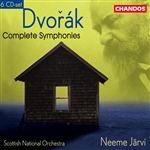 Those
performances from this series that I�ve sampled are competitive
with the best. Alternatively, if you�re looking for strong performances
of two attractive earlier symphonies to add to the recommendations
that I�ve made for Nos. 6-9:
Those
performances from this series that I�ve sampled are competitive
with the best. Alternatively, if you�re looking for strong performances
of two attractive earlier symphonies to add to the recommendations
that I�ve made for Nos. 6-9:
– Symphony No.4, Op.13; Ten Biblical Songs, Op.99 (with
Brian Rayner Cooke, baritone)
CHAN8608 [66:54] � from theclassicalshop.net
(mp3 and lossless) or stream from Naxos Music Library
– Symphony No.5 in F, Op.76; The Water Goblin, Op.107 CHAN8552
[60:43] � from theclassicalshop.net
(mp3 and lossless) or stream from Naxos Music Library
* Bělohl�vek is faster still in his BBCSO version of the
Scherzo with Symphonies 5 and 6 on Warner Classics 825646323562
� I think he�s a little too headlong there, though the rhythm
is infectious; subscribers to the Naxos Music Library can compare
his two versions with those of Serebrier and Alsop for themselves.
His version on Chandos CHAN9475, with Symphony No.5,
also available for streaming from NML, is rather more measured.
I recall that he took just over 12 minutes with the BBCSO at
the Barbican in 2007 without sounding at all rushed, so the
stopwatch doesn't always tell the full story. His timings for
the Fifth Symphony then, too, were quite different from those
on his Warner recording with the same orchestra and different
again from those on his Chandos recording with the Czech Phil
– conductors do change their minds.
Sir Arthur SULLIVAN (1842-1900)
The Yeomen of the Guard (1888)
Donald Harris (baritone), Leonard Osborn (tenor), Darrell Fancourt
(bass), Neville Griffiths (tenor), Martyn Green (baritone),
Richard Watson (bass), Muriel Harding (soprano), Ann Drummond-Grant
(contralto), Ella Halman (contralto), Deirdre Thurlow (soprano)
D�Oyly Carte Opera Company; New Promenade Orchestra/Isidore
Godfrey � rec. 1950. ADD/mono
BEULAH EXTRA 1BX196 [Overture: 4:55], 23BX196
[Act I: 46:34], 24BX196 [Act II: 32:23] � from eavb.co.uk
(mp3)
[individual numbers also available]
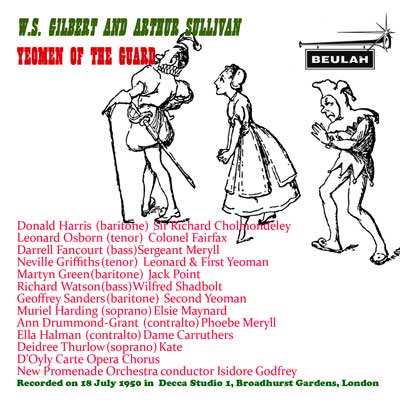 I
have to admit that I�m no expert on, nor, indeed, a great lover
of G&S, apart from confections such as Pineapple Poll.
There are, however, two exceptions where more serious themes
are touched on � Mikado and Yeomen. Later recordings
have come and gone � even the D�Oyly Carte stereo remake with
Sir Malcolm Sargent seems to have disappeared from the catalogue,
though his EMI version remains available* � so the reissue of
this 1950 classic is very welcome, archaic diction and all.
It almost converted me to the G&S cause; now I�m going to
try the Proms performance of Yeomen to see if that conversion
can be complete.
I
have to admit that I�m no expert on, nor, indeed, a great lover
of G&S, apart from confections such as Pineapple Poll.
There are, however, two exceptions where more serious themes
are touched on � Mikado and Yeomen. Later recordings
have come and gone � even the D�Oyly Carte stereo remake with
Sir Malcolm Sargent seems to have disappeared from the catalogue,
though his EMI version remains available* � so the reissue of
this 1950 classic is very welcome, archaic diction and all.
It almost converted me to the G&S cause; now I�m going to
try the Proms performance of Yeomen to see if that conversion
can be complete.
There�s a Naxos Historical reissue of this recording (8.110293/4:
review
� download from classicsonline.com, not available in the USA
and some other countries) but you�ll find the Beulah transfer
a much less expensive proposition. The recording has come up
sounding bright and fresh in this transfer, with just a trace
of overload in the loudest passages.
* EMI 0951072 � download from classicsonline.com
(mp3) or Classics for Pleasure 2134652, both at budget
price.
Josef Bohuslav FOERSTER (1859-1951)
Violin Concertos: No.1 in c minor, Op.88 [31:22]; No.2 in d
minor, Op.104 [33:47]
Ivan Zanatý (violin); BBC Symphony Orchestra/Jiří
Bělohl�vek � rec. 2007. DDD
SUPRAPHON SU3961-2 [65:23] � from emusic.com
or hmvdigital.com
(mp3)
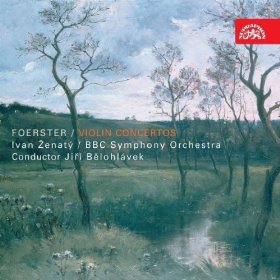
[see review
by Rob Barnett.]
The hmvdigital.com download comes at a much better bit-rate
of 320 kb/s, but the emusic.com is considerably less expensive
and, despite the habitual niggardliness of emusic�s bit-rate,
the sound is more than acceptable � bright and fresh to match
the music and the live performances. The picture of the limpid
stream on the cover just about sums it all up.
Additional Foerster recommendations:
– Velika Noc (Easter Eve Symphony): Supraphon 111
822-3: Prague SO/Smetácek � see November 2008 Roundup
– Wind Quintet in D, Op.95: BIS BIS-CD-612: Berlin
Philharmonic Wind Quintet (+ PLISS,
ZEMLINSKY and REINECKE
Wind Quintets) � from eclassical.com
(mp3 and lossless or stream from Naxos Music Library).
– See also Martinů (below).
Carl NIELSEN (1865-1931)
Maskarade Overture [4:21]; Dance of the Cockerels [5:22]
Sir Oluf He Rides: Prelude [5:38]
Snefrid (Suite for Orchestra) [13:01]
Saul and David � Prelude Act 2 [5:08]
Rhapsody Overture: An Imaginary Trip to the Faroe Islands (FS123)
[10:17]
Willemoes: Prelude to Act III [2:11]
Pan and Syrinx, Op. 49 (FS87) [8:43]
Amor og Digteren, Op. 54: Overture [5:22]
Helios Overture, Op. 17 (FS32) [11:55]
Danish National Symphony Orchestra/Thomas Dausgaard � rec. 2007.
DDD.
DACAPO 6.220518 [72:18] � from eclassical.com
(mp3 16- and 24-bit lossless) or stream from Naxos Music Library
Helios Overture, Op. 17 (FS32) [14:02]
Symphonic Rhapsody in F, FS7 [7:08]
Saga-drøm, Op. 39 (FS46) [10:12]
En Aften paa Giske (FS9) [7:39]
Paraphrase on Nearer My God to Thee, FS 63 [3:39]
Bøhmisk-dansk folketone, Paraphrase for strygeorkester
(FS130) [8:28]
Rhapsody Overture: An Imaginary Trip to the Faroe Islands (FS123)
[9:52]
Pan and Syrinx, Op. 49 (FS87) [8:33]
Danish National Symphony Orchestra/DR/Gennady Rozhdestvensky
� rec. 1983. DDD.
Pdf booklet available
CHANDOS CHAN9287 [70:16] � from theclassicalshop.net
(mp3 and lossless) or stream from Naxos Music Library
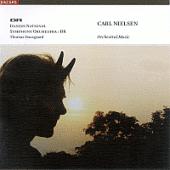
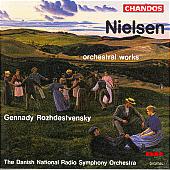 The
big attraction for me on these two recordings is the Helios
Overture, which I got to know by accident � a mail-order catalogue
number error led to an LP recording of this and the Violin Concerto
being sent to me by mistake � and immediately fell in love with.
There�s plenty to love in the other works on these two albums,
as well.
The
big attraction for me on these two recordings is the Helios
Overture, which I got to know by accident � a mail-order catalogue
number error led to an LP recording of this and the Violin Concerto
being sent to me by mistake � and immediately fell in love with.
There�s plenty to love in the other works on these two albums,
as well.
As for the performances and recordings, choice of coupling could
safely be the deciding factor � and there�s even plenty in common
in that respect, too. Both recordings are very good and both
offer the advantage of purchasing the lossless version and returning
later for the mp3. The eclassical.com offers a 24-bit version
as well as the 16-bit.
Chandos have another very fine Nielsen recording:
Violin Concerto, Op.33, FS61 [35:33]
Flute Concerto [17:52]
Clarinet Concerto, Op.57 [25:55]
Niels Thomsen (clarinet); Toke Lund Christiansen (flute); Kim
Sjøgren (violin)
Danish National Symphony Orchestra/Michael Schønwandt
� rec. 1990. DDD.
Pdf booklet available.
CHANDOS CHAN8894 [79:51] � from theclassicalshop.net
(mp3 and lossless) or stream from Naxos Music Library
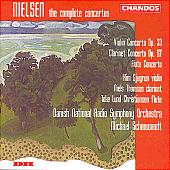 The
only current competitors with this coupling are on BIS-CD-616
� download from eclassical.com
in mp3 and lossless � and Naxos 8.554189 � review.
All may be purchased with confidence � compare them in the Naxos
Music Library if you can. Otherwise, you may well find yourself
obtaining the Violin Concerto in a coupling with the Sibelius,
such as the mid-price version from Cho-Liang Lin and Esa-Pekka
Salonen (Sony SMK89748 � review
� or
on a budget 6-CD set 88697584232) or with the Tchaikovsky
in a new recording which I haven�t yet heard from Vilde Frang
and Eivind Gullberg Jensen (EMI 6025702).
The
only current competitors with this coupling are on BIS-CD-616
� download from eclassical.com
in mp3 and lossless � and Naxos 8.554189 � review.
All may be purchased with confidence � compare them in the Naxos
Music Library if you can. Otherwise, you may well find yourself
obtaining the Violin Concerto in a coupling with the Sibelius,
such as the mid-price version from Cho-Liang Lin and Esa-Pekka
Salonen (Sony SMK89748 � review
� or
on a budget 6-CD set 88697584232) or with the Tchaikovsky
in a new recording which I haven�t yet heard from Vilde Frang
and Eivind Gullberg Jensen (EMI 6025702).
Alexander GLAZUNOV (1865-1936)
Symphony No.6 in c minor, Op.58 [34:26]
Suite caracteristique, Op.9 [32:24]
Russian State Symphony Orchestra/Valery Polyansky � rec. 2003.
DDD.
Pdf booklet available
CHANDOS CHAN10238 [67:00] � from theclassicalshop.net
(mp3 or lossless) or stream from Naxos Music Library
Symphony No.6 in c minor, Op.58 [35:51]
The Sea, Op. 28 [15:28]
Salome, Op.90 [15:26]
Royal Scottish National Orchestra/José Serebrier � rec.
2008. DDD
WARNER CLASSICS 2564 696270 [66:45] � from classicsonline.com
(825646962693, mp3) or stream from Naxos Music Library
[�Serebrier and Warner have the finest modern premium price
cycle available. It combines consistently inspired interpretative
insights, Imperial Russian style and superb audio-technology�.
See review
of complete cycle by Rob Barnett]
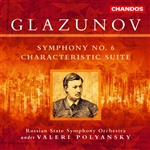
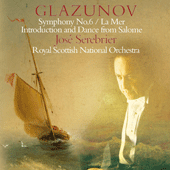 The
Sixth is generally regarded, with some justification, as Glazunov�s
best symphony. If you followed Nick Barnard�s reference to the
super-bargain BIS/amazon.co.uk download set of all the symphonies
(Tadaaki Otaka) � June 2011 Roundup
� or purchased the Melodiya/amazon.co.uk super-bargain set from
Vladimir Fedoseyev which I recommended earlier � November 2010
Roundup
� you may be looking for a version of the Sixth to supplement
the recordings included in those offers. Good as Otaka and Fedoseyev
are, there�s a case for adding one of the better performances
by Polyansky or Serebrier and thereby obtaining some more music
by Glazunov into the bargain.
The
Sixth is generally regarded, with some justification, as Glazunov�s
best symphony. If you followed Nick Barnard�s reference to the
super-bargain BIS/amazon.co.uk download set of all the symphonies
(Tadaaki Otaka) � June 2011 Roundup
� or purchased the Melodiya/amazon.co.uk super-bargain set from
Vladimir Fedoseyev which I recommended earlier � November 2010
Roundup
� you may be looking for a version of the Sixth to supplement
the recordings included in those offers. Good as Otaka and Fedoseyev
are, there�s a case for adding one of the better performances
by Polyansky or Serebrier and thereby obtaining some more music
by Glazunov into the bargain.
There�s very little to choose in the symphony in terms of tempo
and interpretation: Fedoseyev is generally slightly the fastest,
except in the finale where Otaka, Polyansky and Serebrier have
the edge; to the benefit of the music, I think, they are all
faster and livelier than Fedoseyev and within seconds of each
other. Both the Chandos and Warner recordings are good; the
former comes in mp3 and lossless and with pdf booklet, the latter
in mp3 only and without booklet but, at £6.99, it�s £1
less than the Chandos in its least expensive form, on mp3.
The shorter works on Chandos and Warner make for attractive
listening. The Warner couplings are the more substantial, but
if you bought the Fedoseyev bargain and would like to add two
symphonies rather than the Sixth plus other orchestral music,
eclassical.com have Otaka�s Sixth coupled with the First Symphony
on BIS-CD-1369
[71:29] with booklet in mp3 and lossless sound.
Bohuslav MARTINŮ (1890-1959)
Cello Concerto No.1, H196 [27:32]
Josef FOERSTER Cello Concerto,
Op.143 [20:18]
Jan NOVÁK (1921-1984)
Capriccio for cello and small orchestra [19:26]
Jirí Bárta (cello); Prague Philharmonia/Jakub
Hrůša
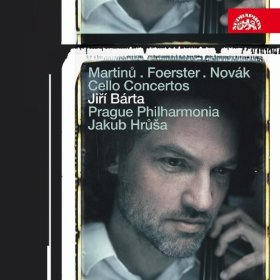 SUPRAPHON
SU3989-2 [67:17] � from emusic.com
or hmvdigital.com
(mp3)
SUPRAPHON
SU3989-2 [67:17] � from emusic.com
or hmvdigital.com
(mp3)
The only problem here is that you are likely to want all the
Martinů cello concertos on Chandos CHAN10574 (Wallfisch/Bělohl�vek
� review
and March 2009 Roundup:
NB: please note new mid-price catalogue number), which
means duplicating one major work from the Supraphon recording.
As with the Violin Concertos, the hmvdigital.com download comes
in better-quality mp3 but the emusic.com has the price advantage.
Ernest BLOCH (1880-1959)
Schelomo [20:06]
From Jewish Life (arr. for cello, strings and harp by Christopher
Palmer) [8:25]
Voice in the Wilderness [23:55]
Max BRUCH (1838-1920) Kol
Nidrei, Op.47 [9:03]
Natalie Clein (cello)
BBC Scottish Symphony Orchestra/Ilan Volkov � rec. September
2011. DDD
Pdf booklet included
HYPERION CDA67910 [61:29] � from hyperion-records.co.uk
(mp3, 16- and 24-bit lossless)
[excerpt from Jewish Life on free sampler HYP212008]
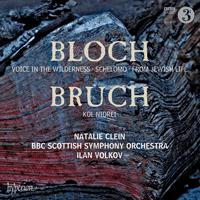 There�s
a late medieval treatise on attaining spiritual enlightenment,
The Cloude of Unknowyng; Evelyn Underhill�s lightly modernised
version of the original Middle English text is available online,
the original text is offered by TEAMS,
with notes, and there�s a Penguin Classics translation. Its
essential message, derived from pseudo-Dionysius the Areopagite,
is that the less we strive to know, the more we are likely to
obtain enlightenment, not advice that I find easy to follow.
In this case I can�t un-know the fact that this recording has
already received some enthusiastic reviews. I don�t think I�ve
been unduly influenced, however, in awarding it high status.
There�s
a late medieval treatise on attaining spiritual enlightenment,
The Cloude of Unknowyng; Evelyn Underhill�s lightly modernised
version of the original Middle English text is available online,
the original text is offered by TEAMS,
with notes, and there�s a Penguin Classics translation. Its
essential message, derived from pseudo-Dionysius the Areopagite,
is that the less we strive to know, the more we are likely to
obtain enlightenment, not advice that I find easy to follow.
In this case I can�t un-know the fact that this recording has
already received some enthusiastic reviews. I don�t think I�ve
been unduly influenced, however, in awarding it high status.
The major work here is Schelomo (Solomon), originally
planned as a setting of parts of the book of Ecclesiastes which
developed into a meditation for cello and orchestra. We weren�t
short of good recordings, some coupled as here with Bruch�s
Kol Nidrei, and two on offer at less than full price:
Steven Isserlis and Richard Hickox on a budget Virgin twofer
and Pierre Fournier and Alfred Wallenstein on DG Originals at
mid price. The Fournier is effectively my benchmark for this
work, as it used to be coupled with the Dvoř�k Cello Concerto
and Kol Nidrei on one of my favourite recordings of the
Dvoř�k (429 1552 � download only). Fournier and
Wallenstein squeeze a little more heartfelt emotion out of the
music than Natalie Clein and Ivan Volkov, who adopt a slightly
faster tempo overall, thereby capturing just a little more of
the great king�s power, though without playing down the more
meditative sections.
I was less enthralled by the two other Bloch works, but that�s
due more to the music itself than to the performances, and Bruch�s
Kol Nidrei rounds off the programme as well as it began;
again Clein and Volkov are a little faster overall than Fournier,
this time with Jean Martinon, or Han-na Chang and Mstislav Rostropovich
on a budget 3-CD set from EMI � review* � without demeaning
any of the music�s quality.
The recording is first-rate and comes in 24-bit Studio Master
sound, still at a very reasonable price.
* download only, from amazon.co.uk.
Even better value on 50 Best Cello and 100 Best Cello,
also from amazon.co.uk.
George LLOYD (1913-1998)
CD 1
Symphony No. 4 in B (1945-6) [60:02]
CD 2
Symphony No. 5 in B flat (1947-8) [57:34]
CD 3
Symphony No. 8 (1961 orch. 1965) [45:28]
Philharmonia Orchestra/Edward Downes � rec. 1982-84, London?
ADD
LYRITA SRCD.2258 [3 CDs: 60:02 + 57:34 + 45:28] � from
emusic.com
(mp3)
[�This Lyrita set is irresistible if you want to explore Lloyd�s
symphonies for the first time�. See review
by Rob Barnett.]
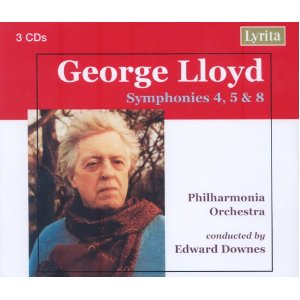 George
Lloyd and Havergal Brian were the neglected English symphonists
of the late 20th century, though Brian is enjoying something
of a posthumous rehabilitation and Albany still offer their
series of recordings of Lloyd�s music conducted by the composer.
If I suggest that Lloyd is the easier to come to terms with,
that doesn�t mean that his music is facile; the Fourth Symphony,
for example, evokes the rigours of the wartime Arctic convoys
from Britain to Russia. There�s plenty of lyrical music, too,
even in this symphony, and nothing really to frighten the horses
in Lloyd�s output. I can�t imagine better performances, even
on that Albany composer-conducted series.
George
Lloyd and Havergal Brian were the neglected English symphonists
of the late 20th century, though Brian is enjoying something
of a posthumous rehabilitation and Albany still offer their
series of recordings of Lloyd�s music conducted by the composer.
If I suggest that Lloyd is the easier to come to terms with,
that doesn�t mean that his music is facile; the Fourth Symphony,
for example, evokes the rigours of the wartime Arctic convoys
from Britain to Russia. There�s plenty of lyrical music, too,
even in this symphony, and nothing really to frighten the horses
in Lloyd�s output. I can�t imagine better performances, even
on that Albany composer-conducted series.
On CD this comes as a bargain 3-for-2 set, £23 from MusicWeb
International � here
� but the download is even more economical � just £5.04.
Even though the bit-rate hovers only around the 190 kb/s mark,
the sound is more than acceptable. You will lose out on Lewis
Foreman�s authoritative notes, but Rob Barnett�s review should
help fill some of the gaps.
Sounds Sublime: The Essential Collection
The Sixteen/Harry Christophers
(with the Academy of Ancient Music and the BBC Philharmonic
in some items)
Pdf booklet included
CORO COR16073 [2 CDs 78:21 + 76:43] � from thesixteendigital.com
(mp3, aac and lossless)
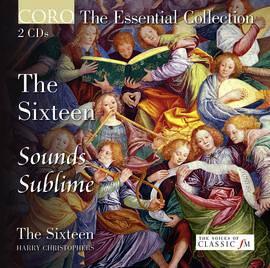 The
music on these two CDs of highlights from the catalogue of The
Sixteen ranges from Tallis, Palestrina and Victoria via Bach,
Handel, Mozart and Brahms to Barber, Britten and John Tavener;
you�ll find details of the full tempting programme by following
the link above. The prices range from £12.99 for mp3 and
aac via £15.99 for flac and alac to £18.00 for the
right to download all formats, which is handy if you wish to
have a lossless version for your audio system and mp3 or aac
for your mp3 player. There�s just one essential caveat � having
heard these snippets you may well want several of their parent
recordings. Those originals are listed in the pdf booklet; those
which aren�t yet available from thesixteendigital.com can be
found at classicsonline.com (mp3) or streamed from Naxos Music
Library.
The
music on these two CDs of highlights from the catalogue of The
Sixteen ranges from Tallis, Palestrina and Victoria via Bach,
Handel, Mozart and Brahms to Barber, Britten and John Tavener;
you�ll find details of the full tempting programme by following
the link above. The prices range from £12.99 for mp3 and
aac via £15.99 for flac and alac to £18.00 for the
right to download all formats, which is handy if you wish to
have a lossless version for your audio system and mp3 or aac
for your mp3 player. There�s just one essential caveat � having
heard these snippets you may well want several of their parent
recordings. Those originals are listed in the pdf booklet; those
which aren�t yet available from thesixteendigital.com can be
found at classicsonline.com (mp3) or streamed from Naxos Music
Library.
Second thoughts
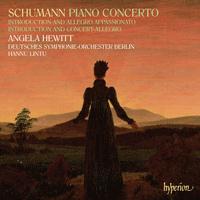 Geoff
Molyneux has provided some additional thoughts on the SCHUMANN
Piano Concerto and other works (Angela Hewitt, Deutsches
Symphonie-Orchester/Hannu Lintu Hyperion CDA67885 [62:00]),
which I reviewed in the August 2012/1 Roundup:
Download of the Month.
Geoff
Molyneux has provided some additional thoughts on the SCHUMANN
Piano Concerto and other works (Angela Hewitt, Deutsches
Symphonie-Orchester/Hannu Lintu Hyperion CDA67885 [62:00]),
which I reviewed in the August 2012/1 Roundup:
Download of the Month.
Angela Hewitt gives a revelatory account of this oft-recorded
concerto. The introductory cascade of piano chords is clean
and straightforward with no quirkiness of expression or tempo
as in some recordings. The first theme is then beautifully enunciated
by well-blended reed woodwinds with the theme ravishingly played
by the oboe. Then Hewitt repeats this first subject a little
more slowly with lovely tone and expression. The tempo soon
picks up however with the next entry of the orchestra. I only
have one niggle, which is that I am unconvinced by the sudden
tempo increase at the commencement of the forte octaves
a little further on. I find this quite a jolt, and she does
the same in the recapitulation. Also it is not totally controlled,
as well as being unnecessary. Radu Lupu has the right idea here
and there is no tempo increase marked by Schumann. Hewitt plays
beautifully in the Andante espressivo where we hear a
sublime dialogue with the orchestra�s excellent principal clarinettist.
The third movement is a little on the slow side but this does
allow for real clarity of texture and articulation. There is
real transparency in this light and airy performance, for example
at the beginning of the development section in fugato style.
I do find that as much as I admire this interpretation it does
lack a real sense of vivace in this Allegro vivace
movement. Radu Lupu, with André Previn and the London
Symphony Orchestra*, gives a more fiery and exciting performance.
Although Hewitt is very refined, her leisurely pace ensures
that there is no sense of danger here.
The performance of this concerto is very fine and well worth
hearing but I would not make this my benchmark recording.
It is good to have the additional two works presented here rather
than the inevitable Grieg Concerto. There is a lovely balance
between the orchestra, which has the main thematic material
at the start, and the arpeggio figures in the piano at the commencement
of the Introduction and Allegro Appassionato. There then
follows some scintillating playing with much rhythmic zest in
the ensuing Allegro Appassionato. Again in the Introduction
and Concert-Allegro, there is some superb playing from Hewitt.
The solo piano cadenza towards the end has some tender moments
as well as more dramatic sections. Beautifully performed and
recorded!
Hewitt�s performances are characterised by lightness of touch
and great clarity of texture, and all three works are well-recorded
and performed. In spite of my minor reservations in the concerto
I strongly recommended listening to this excellent Schumann
recording. I also like Angela Hewitt�s interesting and informative
programme notes.
Geoffrey Molyneux
* Decca Legends 455 3832, with Grieg, rec. 1973 � download
from hmvdigital.com
(mp3) or in lossless from deutschegrammophon.com
***
The Essential Collection: Benny Goodman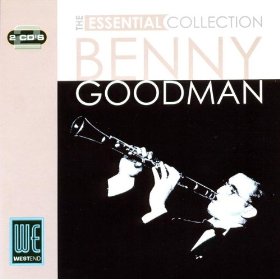
Benny Goodman Trio, Quartet, Sextet, All Star Band and Orchestra
� rec. 1933-1952. ADD/mono
WEST END AVID AV864 [2:37:03] � from
amazon.co.uk (mp3)
Two CDs � 48 tracks in total � of vintage Goodman recordings
in decent transfers, as recommended by Geoffrey Smith in Jazz
Legends, all for just £4.99; that�s good value in
any book. Strongly recommended; burn as an mp3 CD via iTunes
for playing in the car or sync to your mp3 player. The only
grumpy comment on the amazon.co.uk website is from someone who
couldn�t play the tracks but did get a speedy refund!












